Luna (Lindsey) Corbden's Blog, page 5
February 11, 2013
Radcon 6A Panel Schedule
I am honored to be on the panel schedule for Radcon 6A, this coming weekend, February 15-17th, 2013, in Pasco, WA.
I consider Radcon my home con. Not to jinx it, but I've attended every Radcon since my first in 1995. Though I no longer live in Eastern Washington, I make the long trek through the mountains back to Mordor, each year, and not even a pain-wracking, can-barely-move kidney infection has stopped me. It's a good con, "medium sized" by the old standards, but with cons like PAX exceeding 70,000 attendees, I suppose it's a small gathering.
Since my youthful days, when I still held the illusion that being a writer was glamorous and could get you lots of money and free stuff, I dreamt of being a panelist at Radcon. Now that day has arrived.
My schedule begins with a reading Friday evening at 5pm. I am currently planning to read my two recently published stories, Beyond Earth's Summer and Let the Bugs Work Themselves Out. If there's time, I may read a passage from Emerald City Iron.
Then I'm on four panels over Saturday and Sunday about various writing and fiction topics. I'm greatly looking forward to it, and I hope when I'm up there, I will actually have something interesting to say. If you're there, stop by and see me!
Fri Feb 15 5:00:pmFri Feb 15 5:30:pmLuna Lindsey readingSmall PressLuna Lindsey reads from her favorite writing.Lindsey, Luna
Sat Feb 16 12:00:pmSat Feb 16 1:00:pmWorld Building for Planets2201How do you create a world for your characters to interact in? This panel will cover everything to creating planets to finding names--stressing the importance of building a solid world and keeping it solid.Lindsey, Luna Gregory, Hugh Morrigan, MuffySat Feb 16 1:00:pmSat Feb 16 2:00:pmSex, Love and Writing in a Changing WorldFan RoomAlternate sexuality is one of the final, vastly unexplored elements of science fiction and fantasy. Where has it been touched upon, and why so few times? Is it time to examine it, or should it stay in the shadows?Burk, Jim Lindsey, Luna Jones, Peter Morgan, Christine Tamra, ExcellSun Feb 17 11:00:amSun Feb 17 12:00:pmStop Thief!Small PressWith the increasing popularity of ebooks comes the increasing opportunity for scam artists to take credit for the work of others. As a fan, how do we stop and address these issues? As an artist and author, how can you protect yourself and your intellectual interests? Join our panel of experts as we discuss what measures are available for both fans and authors.Burk, Jim Lindsey, Luna Jones, PeterSun Feb 17 2:00:pmSun Feb 17 3:00:pmWhy Horror (and beyond)?2207Our symbiotic relationship with genre films that feature elements of dread - why do we like them? And how do they reflect our society?Lindsey, Luna Leota, Ron Snively, Devi
I consider Radcon my home con. Not to jinx it, but I've attended every Radcon since my first in 1995. Though I no longer live in Eastern Washington, I make the long trek through the mountains back to Mordor, each year, and not even a pain-wracking, can-barely-move kidney infection has stopped me. It's a good con, "medium sized" by the old standards, but with cons like PAX exceeding 70,000 attendees, I suppose it's a small gathering.
Since my youthful days, when I still held the illusion that being a writer was glamorous and could get you lots of money and free stuff, I dreamt of being a panelist at Radcon. Now that day has arrived.
My schedule begins with a reading Friday evening at 5pm. I am currently planning to read my two recently published stories, Beyond Earth's Summer and Let the Bugs Work Themselves Out. If there's time, I may read a passage from Emerald City Iron.
Then I'm on four panels over Saturday and Sunday about various writing and fiction topics. I'm greatly looking forward to it, and I hope when I'm up there, I will actually have something interesting to say. If you're there, stop by and see me!
Fri Feb 15 5:00:pmFri Feb 15 5:30:pmLuna Lindsey readingSmall PressLuna Lindsey reads from her favorite writing.Lindsey, Luna
Sat Feb 16 12:00:pmSat Feb 16 1:00:pmWorld Building for Planets2201How do you create a world for your characters to interact in? This panel will cover everything to creating planets to finding names--stressing the importance of building a solid world and keeping it solid.Lindsey, Luna Gregory, Hugh Morrigan, MuffySat Feb 16 1:00:pmSat Feb 16 2:00:pmSex, Love and Writing in a Changing WorldFan RoomAlternate sexuality is one of the final, vastly unexplored elements of science fiction and fantasy. Where has it been touched upon, and why so few times? Is it time to examine it, or should it stay in the shadows?Burk, Jim Lindsey, Luna Jones, Peter Morgan, Christine Tamra, ExcellSun Feb 17 11:00:amSun Feb 17 12:00:pmStop Thief!Small PressWith the increasing popularity of ebooks comes the increasing opportunity for scam artists to take credit for the work of others. As a fan, how do we stop and address these issues? As an artist and author, how can you protect yourself and your intellectual interests? Join our panel of experts as we discuss what measures are available for both fans and authors.Burk, Jim Lindsey, Luna Jones, PeterSun Feb 17 2:00:pmSun Feb 17 3:00:pmWhy Horror (and beyond)?2207Our symbiotic relationship with genre films that feature elements of dread - why do we like them? And how do they reflect our society?Lindsey, Luna Leota, Ron Snively, Devi
Published on February 11, 2013 13:15
January 31, 2013
Beyond Earth's Summer on Penumbra Rising Talent
I am pleased to announce that I was published as January's Rising Talent in Penumbra eMag. The January 2013 theme was Ray Bradbury to celebrate the life of the great science fiction author who passed on last June.
In addition to my short story, I was asked to write an essay about Ray Bradbury. The story itself tells of the last woman on earth, and her desperate struggle to find meaning on a lonely planet.
Please read my essay and story, Beyond Earth's Summer. It's free.
In addition to my short story, I was asked to write an essay about Ray Bradbury. The story itself tells of the last woman on earth, and her desperate struggle to find meaning on a lonely planet.
Please read my essay and story, Beyond Earth's Summer. It's free.
Published on January 31, 2013 14:58
January 23, 2013
My Inner Life: Adventures With Asperger's
They say if you meet one person with Asperger's, you've only met that one person with Asperger's. I know several diagnosed aspies, and it took me this long to realize I was like them.
Asperger's, like other forms of autism, is difficult to understand. On the outside, autism manifests quite differently in different people. Is it difficulty expressing empathy? Is it self-stimulating (aka "stimming") by rocking or hand-flapping? Is it avoidance of eye contact? Is it talking too loudly? Is it a lack of friends? Is it preoccupation with special interests? Is it poor motor control?
The answer is any of the above, some of the above, or all of the above. What defines autism is not the outward manifestations of our condition. It is our inner world. It is in how our minds operate. It is our unusual senses and the mixing of our senses and the oversensations and blocking of sensations and having a mind that's on a high-speed railway when we're trying to focus on just one thing, and a low-speed railway right when we need to function. Though we experience unique inner-worlds, we have far more in common with one another than we have with neurotypicals (NTs).
I want to show you what it is like to live inside in my head. It is a colorful world, a verbal world, a world of impressions and shapes and impulses and words and thoughts that can never be put into words no matter how much I struggle. It is a place where new connections are constantly being formed, where I am testing the truth of every statement, searching for contradictions, searching for commonalities, searching for patterns and puns and odd ways to fit everything together.
My mind wants to hear everything, see everything, take it all in. And sometimes it breaks down because it has taken in too much. I want to know people in impossibly deep ways, and yet want to avoid them because the disruptions they cause to my steady stream of thoughts is nearly intolerable.
I do not settle for simple. I will not abide ordinary. Welcome to my inner life.
Briefly, what is Asperger's? As I implied above, this is not a question I can answer in this one post. In short, Asperger's is a type of autism with limited outward symptoms which allows the autist to "pass", and yet, there is still just enough "off" from neurotypical behavior to cause impairment, or even great difficulty, in life.
It also manifests in exceptional talents. Many of society's greatest thinkers and creators were thought to be autistic.
I will use these words interchangeably: autist, autism, ASD (autistic spectrum disorders), Asperger's, and aspie. If I say "autism" I am referring to the broader topic, a trait that is likely in common with others under the larger umbrella of the autistic spectrum. If I say "aspie", I am referring more specifically to high-functioning autism, i.e. verbal autists similar to myself.
Scientific understanding of autism has changed a lot in the last five years. I never much related to traditional descriptions of aspie behavior. I make eye contact well enough to pass and have a vivid imagination. I can recognize faces and I have plenty of empathy. Some of the traits, like these I've listed, are being dropped from or de-emphasized in the diagnostic criteria.
With these new definitions, I match highly, especially on the intellectual and social scale. The best-regarded online quiz, aptly named the Aspie-Quiz, scores me thus:
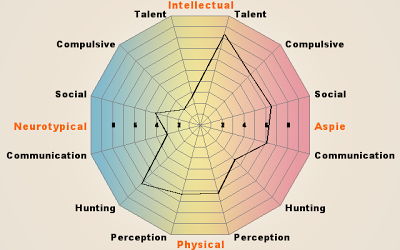
I do not have a diagnosis. I am pursing one now, and at that time I hope to have a better map of myself. For now, I'm gaining understanding by comparing notes with other autists. My daughter was diagnosed last year. I have aspie friends. I read the WrongPlanet.net forums. I'm reading blogs and buying books on the topic.
A new theory, called Intense World Theory proposed by Henry and Kamila Markham, offers a unified view that explains all autistic behaviors, including those that sometimes fall outside the diagnostic sphere. It is also the first view of Asperger's that I could relate to. I highly recommend reading it in full. It is a far better description of autism and Asperger's than any symptom list I could point you to.
According to the Markhams, my neurons are supercharged. The connections between them are hyper-reactive and hyper-plastic (pliable).
My world is intense. My senses are intense. My inner life is intense. Normal lights can seem too bright. Sounds can seem louder to me, or too piercing. My senses sometimes get mixed up - a barking dog causes anxiety and also a sensation very much like pain that zaps through my body like an electric shock. A crowded mall can cause me distress, as can a disapproving look on someone's face. Stimulation can build up like layers and lead to a state of overstimulation - a tense feeling, a tired feeling, like I have to strain to try to block it all out. I can feel all my skin in these times, and my muscles, and I want to crawl outside myself. I want nothing more than to curl up in bed with no sounds or lights, so I can finally relax.
Even good stimulation can lead to this state. I love loud music, like rock and dubstep, but I can only listen to it for so long. I know the feeling well, when it's time to tune to something mellow. If I'm at a party, that feeling means I need to hide in the bathroom for a few minutes to get steady again. If it's too much, I know I am completely done and it's time to go home.
I don't just get stimulated by outer sensations. My emotions are also intense. I can feel emotional pain in my hands and feet. I can also feel limerence in the same places. All my life I thought this was normal. Now I'm learning it's not.
On the upside, I'm a deep-thinker. I get addicted to making connections, and that leads to ideas, and I get addicted to that feeling as well. A stimulating conversation can generate a dozen ideas in me, ideas I know I will never have a chance to implement, let alone express. Yet I feel compelled to express them as often as possible, as if they are alive and don't want to die. Twitter is perfect for giving me a constant sense of expression, even for the little ideas.
So it is my intense inner life that makes me autistic, not how I make eye contact or express empathy.
The Markhams explain very well why autists are so varied in behavior:
Perhaps the best way to describe autism is that an autistic mind gets very, very good at some things. Because of that, resources are diverted away from other things. Hence the autistic-savant. All autists are autistic-savant to one degree or another. Think of Rainman on a milder scale.
Autism impacts my social life. All of my thirty-eight years, I have felt misunderstood, like interactions with others is a mystery code I can never fully understand. I don't experience social encounters the same way NTs do. It does not flow naturally or instinctively for me.
I don't know how to leave conversations I don't like, or change the subject. I do know how to sit for long periods of time, listening, whether I am interested or not. I do not know how to initiate conversations, even with people I know well. Small talk is feels meaningless to me, even though I understand, consciously, why it is useful. Being in group settings is stressful and draining - even when I'm having fun. I assume that by default, people don't like me until I manage to make them like me, so I don't feel I should push myself on them until they've granted me undeniable permission to enter their world. I have a hard time reaching out to friends and loved ones to maintain connections.
If you know me, you may see me manifest autistic traits. Or maybe not. I have hidden many of them well, since I am driven to be liked.
In some ways, my traits are difficult to define. Most of things that I am very good at, I am also very bad at, depending on the situation. The inverse is also true. It's hard to say, "I have a very good memory", because it depends on the type of thing you want me to remember, how stressed I was when I learned it, whether you're reminding me in a way that will recall it. Sometimes I have a very bad memory.
Likewise, it's hard to say, "I'm always on time". I'm usually on time, but it requires alot of effort. If I'm distracted or feeling lazy, I will be very late.
Here are more ways my autism manifests:
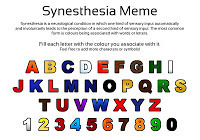 Synesthesia
. Synesthesia has been linked to autism. I have grapheme-color synesthesia. I posted a description of this previously.
Synesthesia
. Synesthesia has been linked to autism. I have grapheme-color synesthesia. I posted a description of this previously.
Hyperlexia . I am fascinated with words. Not only are they colorful (see Synesthesia), but I love examining their meanings, their links to other words, their origins, and how they can be strung together with other words to create meaning. I also love puns.
Anxiety. I struggle with this comorbidity regularly. I once thought my level of anxiety was typical - it is not. I once thought I'd developed a certain low-level of anxiety as a coping mechanism for ADHD, to help motivate myself and that sometimes circumstances push that into overdrive. That may still be true. It is also true that overstimulation, social situations, instability, unpredictability, and conflict lead me quickly into anxiety.
Meltdowns. Anxiety, overstimluation, sudden unpredictability, and conflicts can lead to meltdowns. Feeling trapped in a bad situation, either literally or figuratively, will melt me down every time. For me, this experience is almost identical to a panic attack. I cry, I have trouble breathing, I get weak in the knees, I want to run away, I feel like the world is ending or that I want to die, all my nerves are on fire and I feel an ache in every bone. Sometimes I bite myself, which seems to help dampen the emotional pain. Sometimes I want to hurt myself more, but I usually have enough control that doesn't happen.
Now and then I have a minor "meltdown" that manifests in anger. I'm not sure I would call it a meltdown, because I seem to have more control and awareness of my surroundings.
Stability. I need certain things in my life to be predictable. I need to know where my next meal is coming from - even if I'm avoiding eating due to anxiety or distraction, I need to know that when I do decide to eat, I'm going to have something available.
I need to know my schedule is somewhat predictable. I need to know I have a place to live and a way to pay my bills.
I also need to certain things to be where I left them. I try to keep things in the same place (if I don't, I can't find anything). If that object is gone when I need it, I quickly get frustrated, sometimes unreasonably so. I want to blame others for the misplacing, because it seems illogical I would ever do something like that to myself, though sometimes it is my fault and my accusations are inappropriate.
Constants. When creating or thinking about problems, I need some things to be "locked in". If none of the parts want to "hold still", I get frustrated and anxious and the problem seems unsolvable. I will go around in circles looking for something I can anchor, and if I can't, I will keep going in that circle.
For instance, if I'm writing a new plot, I feel a sense of relief when I can decide on enough plot points that they can create a firm frame. Maybe that frame isn't filled in, but now that I have a space to fill, I'm good. If I have several ideas, but unsure what order to put them in, I feel unsteady.
Special Interests and Hyperfocus. I hyperfocus. I can move from topic to topic, but once I'm in the midst of a topic or activity, I feel compelled to keep thinking and acting on that task. These days, I can't stop thinking and writing about autism, even though I have other things to do. I have had so many hobbies and topics of interest that I have a hard time remembering them all.
In this same area, I have a hard time switching from one type of task to another. When I was remodeling my house, that was all I did in my spare time. I had a hard time wrapping my mind around the idea of writing. Now that I write, I have a hard time wrapping my mind around little fix-it tasks around the house. Even if that task might only take five minutes, the internal energy required to shift gears is tremendous and may take hours. I can be good at anything I set my mind to -- the trouble is setting my mind.
Being interrupted during certain types of tasks is stressful or even upsetting to me. When I am focused on a task, I often lose sight of others and I have to struggle to not ignore them completely. This can go on for days at a time.
My motivator to shift gears, of course, is to maintain stability and lack of conflict. So maybe I don't want to stop writing to pay the bills, but if I don't, I may have a conflict or lose my place to live. It's a viscous cycle which contributes of a sense of constant anxiety.
Stimming. I have always stimmed, but I did not realize it. At some point, I found ways to stim that no one would notice. I chew on the inside of my mouth. I've done that since I could remember, and until now, have always wondered why I couldn't stop. I tap my toes inside my shoes where no one can see. I tap my foot or move my leg. I rub my arms and move my tongue and hug myself or curl in on myself. I fidget with objects. I chew gum.
Now that I understand stimming, I find myself rocking when I'm alone or with close family. I think I've always had the urge to do it. It is calming and helps me think, though it always leaves me a little tired.
When I'm highly stressed, like in an argument, I have always found a piece of skin I can rub, sometimes so hard it hurts. And I wring my hands. And I rock. It distracts me from the overwhelming fear.
Routines are very important to me. I hesitate to say that, because I also don't like being hemmed in by schedules. So I should say there is a minimum level of routine I need. It is required. If I do not get it, I become unsettled or anxious or even angry. Too much routine keeps me from my hyperfocus, distracting me with mundane and pointless activities. That will also agitate me.
Clothing & Hygiene. Along those lines, I have little interest in popular fashions and keep a minimum level of daily hygiene. Yes, I shower daily and brush my teeth and coordinate my colors. But I prefer haircuts that require little maintenance. I never understood how to apply makeup and never had the desire. I will go to extra effort if I'm going on a date -- I may put on lipstick and wear something fancy and accessorize. But not every day.
I like comfortable clothes. Clothing can cause irritation and distraction pretty quickly. So I wear soft materials. Keeping warm is very important. Typically I wear only slight variations on the same clothing day in and day out. These days, that means my black kilt, a long-sleeved shirt with an ironic t-shirt over it, and thigh-high socks. It may look like I put a lot of thought into it, but my secret is I'm aiming to put as little thought into it as possible.
Nylons and high heels cause me no end of discomfort. So if I'm wearing those, it's a pretty special occasion.Concrete Thinking. In many ways, I am a concrete thinker. I want to build to larger concepts using specific examples and information. I can learn in random ways, by picking up things out of order and from different sources, but I prefer to relay those to others in sequential order. Of course, all of this depends on the subject and on whether I am writing/reading, or listening/speaking.
I create and solve problems by collecting as much information as possible before acting. I feel "incomplete" if I have not learned as much as possible.
I can become obsessed with the details. When I am writing, I sometimes cannot continue until I have found exactly the right word or name. I cannot continue if I don't have a good understanding of the setting. If it is set in a real location, I must visit the location and record all the details to ensure I get it exact. Letting go of this when I'm stuck is very difficult.
Honesty. I have a keen sense of honesty. To a fault, sometimes. If I'm making a statement, I feel the need to qualify it to ensure I am telling the complete truth. I cannot simply say, "The sky is blue", because if there is a cloud in it, it's technically a bit white, and I feel I am lying if I don't qualify.
This gets me into trouble in a number of ways. In social situations, I can come off as pedantic, long-winded, or hung up on details. In conflicts, I sound like I'm defensive. In my writing, it means I have trouble generalizing. While I can omit information for the sake of tact, I find it impossible to lie or misconstrue truth, even in situations where most people find it acceptable. If someone misunderstands me, it feels like I am being dishonest.
Social Overwhelm. In many social settings, especially group settings like parties, I feel like I'm watching a DVD on fast-forward. Everything seems to be happening at once, and I don't have time to take it all in and react properly and in a timely fashion. Sometimes there is a 1-2 second delay between me hearing words and understanding them, which in most conversations is far too long for appropriate reaction times. My coping mechanism is to nod and say, "Yeah", which gives me time to process. But sometimes that backfires, for instance if the mood suddenly shifts. My reaction to the mood shift will seem out of place. This makes it very hard to flirt, show empathy, make friends, and express my thoughts. I often find myself thinking of what to say two seconds too late. I will hold onto the thought hoping I will get another chance, but often the conversation has moved on without me.
Sometimes it means I talk too fast. Time is marching on and I need to get it all out. Sometimes I'm afraid someone will interrupt me, but often it's because my thoughts are larger than the time allotted. Especially when everything is sped up.
If I can sit back and observe, if I can become invisible, time will slow down. I also prefer one-on-one interactions. It is comforting to be with one person I trust. I can relax my insides and converse and be myself.
Expressions. Sometimes my face doesn't make the right expressions. I don't think it's because I'm feeling the wrong thing in the wrong moment -- usually I'm feeling the right thing, but who knows what my face is doing. I often hear, "What's that look for?"
Because of that, I'm self-conscious of my expressions. I have force myself to maintain the expected face. That has led to a few other problems. For instance, when I'm uncomfortable or nervous, I get this plastered-on smile. To anyone who knows me extremely well, they know what that look means. But to someone new, they think I'm having the best time ever. Sometimes I am, and I'm just nervous because I'm afraid they won't like me. Other times, I am very uncomfortable and end up sending exactly the opposite signals I should. When my cheek-muscles start to hurt, I have to ask myself, "Am I smiling alot because of genuine enjoyment? Or am I faking enjoyment in a bad situation?"
Eye Contact. As I mentioned, I have no problems maintaining eye contact in conversation. However I have trouble understanding the rules of eye contact outside of conversations. I try not to look at people at all, and if someone looks at me, I feel nervous and look away instantly. It never occurs to me that their eyes are trying to communicate without words, and that I should look and try to understand. Even if I did understand, I wouldn't know how to "reply". I'm learning now that this is how people show one another they're interested, and I'm having to consciously train myself how to do it.
Inappropriate comments, timing, conversation topics, etc. I have to edit and scan everything that comes out of my mouth. Twice. Because if I don't, I will say something inappropriate, insensitive, cruel, crazy-sounding, or idiotic. Sometimes it's the content, but often it's just in my choice of phrasing. This is especially likely to happen while flirting, and I have ruined many a possible connection by letting myself go and saying something completely irretrievable. Sometimes I don't even want to bother, or the risk is too high, so I only speak when what I have to say is really important and I've had a chance to scan it twelve different ways to make sure it can't be taken wrong.
Introspection. I am incredibly introspective. I love self-awareness and love to learn new things about myself. I don't know if this is particularly an autistic trait, but judging by the level of introspection on the WrongPlanet forums, I'd guess it is.
Repetitious Activities. I need "downtime" for my brain. I need a repetitive, easy task I can run on autopilot. This is where video games come in. I do like difficult video games, but those fill a different role. I'm talking about solitaire or Bejeweled or an RTS I can set on easy and mindlessly build and build and build. Sometimes, I use this time to process emotions and situations. Sometimes, I get new ideas. The other times it's like a state of meditation. Maybe it lets my mind rest.
Failure. I am extremely frustrated by my own failure. I have high expectations of myself. So many successes come to me without effort, so I expect I should succeed easily at everything. I don't like to participate in activities where I might fail. I don't like making mistakes. It often comes as a shock when I do, and I go to great lengths in life to avoid it.
Getting in Trouble. I don't like "getting in trouble". Many describe an Asperger's sense of justice, a rigid feeling of right and wrong that should never be violated, and part of it is related to this. The rest is response to trauma I experienced in first grade from an abusive teacher. I fear being judged by authority figures. I fear hurting other people's feelings. I fear being disliked. I go to great lengths to avoid "getting in trouble", and if I do, the emotional impact is like getting hit in the stomach.
Scrutiny. I have a strong aversion to scrutiny. If I am creating, I want to do it in private until the final product is ready. I don't like being judged and I hate when people make assumptions. I strongly dislike being misunderstood. On the other hand, I do invite constructive criticism at the right time, when I'm expecting it.
Empathy is a complex subject for me. If someone is distressed, and I know it, I feel instant concern. Sometimes I feel it too deeply. Sometimes, if I try to imagine what it's like to be in a horrific situation, I get lost in that thought. It consumes me. Then I dare myself to try to understand the suffering of all people in in the world, and I get locked in that place. It is hard to escape. Conversely, it is hard for me to express empathy. I don't know what to say or do, and that causes fear. I worry overly much that I'm doing it wrong or that they will mistake my expression.
Other times, I get defensive. I don't like being the cause of someone else's hurt and will go to great lengths to avoid it. Tiring lengths sometimes. So if someone accuses me of upsetting them or doing something wrong (see "getting into trouble"), I will react with aversion. Worse are the times when I do feel empathy, and I start by trying to "fix" the problem. I genuinely want to solve the other person's hurt, and in the attempt, it seems as though I'm denying their pain.
Intentions. Some have written that aspies have a non-typical relationship to the idea of "intentions". I have examined my own views on the matter and compared them to Roland's (my partner). When it comes to resolving an issue, I am very concerned with outcomes. Intentions don't matter because they are in the past. I want to focus on the behavior and on actions moving forward. But when it comes to examining the "why" of something, then motives are everything. If I have been hurt, it helps me to know the other person did not intend it. If I have hurt someone, it matters that they know I did not intend it. Apparently, not everyone thinks this way.
Motor Skills. I am actually well-coordinated for an autist. But again, it depends. I have created sculptures with meticulous, tiny features, that required high levels of dexterity. I'm also a pretty good dancer as long as I have a good partner. But there are days when I'm dropping everything and falling all over myself. It's like pieces of my mind just shut off sometimes.
Accents. I am very good with accents. I always have been. If I am around certain accents too long, I feel compelled to mimic them. I worked with a guy from South Africa, and every time I went to his office, I had to fight to not slip into his voice. I knew doing so might offend him. I can hear subtle differences in sounds. Scientists say that there are differences in vowels in Chinese that Westerners simply cannot hear because our brains didn't hear them at an early age. But I swear I can hear the difference.
Pitch. My guess is I would have perfect pitch if I trained myself. When I have a song running through my mind, even if it's just a clip, I hear it in every detail, including all the backup instruments. If I then play that song, it is in the same key. So all I would need to do is memorize the note name with the note "sound" and I'm good.
Alternate Sexuality and Relationships. They find that autists tend to participate more in alternative lifestyles. I can't do simple when it comes to sex and relationships.
Monologues. I know a wealth of information and I want to convey it all. So if I get started on a topic, it's hard for me to stop, even if others are getting impatient. Sometimes I don't even notice they are impatient or uninterested because I find the topic so exciting.
Invisibility. Sometimes I become invisible. I am in a store, and people don't see me. Everyone will nearly run into me, and I will have to dodge to get out of their way.
Appropriate Emotional Response. Sometimes I feel emotions inappropriately. I will feel nothing when I should feel sad. I will feel sad when I should feel happy. This doesn't happen very often, but it happens often enough that I am in a constant state of doubt as to whether any of my emotions are appropriate. Often my emotions are delayed.
Strong Squicks. If someone has a real wound or there is blood coming from an injury, I get squicked, in a physical way. I feel pain where their wound is. I also feel pain in my legs and sometimes in my gut. It's a twitching kind of pain that spasms and moves around. I get the same effect when someone is describing a real wound, for instance a surgery they once had. Fictional and imaginary blood does not have this effect. I love horror films, and in fact have a fascination with vampires.
Out of sight, out of mind. If something is not "in my view", I tend to forget about it. It ceases to exist. It could be a book I've been meaning to read, or a movie I want to watch. It can be important tasks that need doing. It can be clothes and accessories I really enjoy wearing, or a food I love to eat. This leads to a messy desk and room, but it's a type of clutter that makes sense to me. I can even forget about people I know and like, and I fail to maintain relationships for this reason.
Brain Filing System. Extending this further, if I am not reminded of a thought in a certain way, I cannot remember it. For instance, if you ask me, "Where do you want to eat?" I will draw a blank. Nothing will help me think of an answer. It doesn't matter if three times that week I thought of places I liked to eat. Conversely, if you were to say, "Would you like to eat at Bleu Bistro?" I will remember that it is one of my favorite restaurants and want to go there (and simultaneously I will remember everything I know about Bleu and all the memorable times I've eaten there and what's on the menu and my favorite drink and the scene in my novel that uses it as a setting). It's almost like I have a filing system, but items aren't always filed in useful ways. This can be very frustrating.
Touch. Certain types of touch are extremely comforting. Other kinds of touch are irritating. I'm still trying to figure this out.
Oversensitivity to Fragrances. I long-thought this was an allergy, but I realize my reactions are not typical allergic symptoms. Perfumes, floral scents, and other strong fragrances cause my head to feel pinched and my nose to feel raw. I don't get a runny nose, just a pressure all over. The smell seems to invade my body until it's everywhere. If I'm forced to stay around it long, it will ruin my whole day and I won't feel right until the next day.
Usually scents of something edible are fine. So vanilla, berry, hazelnut, etc. This rule doesn't always hold up - some products, including some candles, include a bad base-ingredient, and then it doesn't matter if it's vanilla. I burn candles constantly, and I have to give soap, lotions, deodorant, and shampoo a sniff-test before purchase. If I wash in a badly-fragranced soap, it doesn't matter that it rinses off. I can still smell it all day. When I travel, I bring my own soap.
Scent-Stim. Contrawise, scents can help me think when I'm writing. I keep a vanilla bee bar and lemon-cream lotion near my desk and when I need to concentrate, I put it on my hands and sniff. This is probably a form of stimming.
Aloof. I can seem distant and aloof. There are lots of reasons for this that are far more complex than what they seem on the surface, including most of what I've already described about my social difficulties.
Attraction. "Often are attracted to another purely because they are attracted to us". When I saw this on a list of traits, my jaw dropped. I've known this about myself forever. I never understood why. It is interesting to know there are others like me.This trait, combined with my aloofness and social awkwardness, makes it really hard to get a date.
Insights. I often have deep insights into people, their motives and desires, and how two or three people interact and react to one another. I can assemble these insights with very few clues, and I am often right. I can see why everyone is acting like they are, and understand everyone's reasons, even when people are in conflict. I often stay neutral in other people's conflicts. I don't want to side with anyone. I also feel frustrated because these understandings come to me in non-verbal ways. So communicating what I sense is really difficult, and my attempts to do so risk making things worse. Coming up with solutions to resolve the situation is equally elusive.
Need to Be Heard. The content of my brain wants to be let out. It doesn't matter that no one wants to hear it. It doesn't matter that saying things might hurt, bore, offend others. It doesn't matter that I've already said it two or three times. I want to say it again. I do have some self-control on this urge, and if I imagine what I say will hurt or bore someone, I won't say it. But I still want to.
Puzzles. I love complex, detail-oriented problems that need untangling. I am driven to open the box and see how it works. I cannot learn unless I understand the "Why", not just the "How". This served me well in my long career in IT, troubleshooting software issues.
Imagination. Unlike the traditional criteria for Asperger's, I actually have a very vivid imagination. I am a writer, after all.
Non-Literal Meanings. I also, unlike the traditional criteria, can understand non-literal meanings. Metaphors come easily to me (especially when I practice), as do double entendres. However, I would add that my mind often simultaneously can see the literal meaning. It adds to my ever-present internal sense of humor and amusement at the world, and my fascination with words, and my unhealthy predilection for puns.
Naivete & Trust. I tend to take people at face-value. If someone intends to convey a meaning to me, I never doubt them. I never suspect they may have ulterior motives or internal conflicts. I assume everyone has an honest soul until they prove otherwise. This leads to a certain level of naivete. It also leads to a ton of confusion on my part, especially if my instincts and feelings about a person are in conflict with what they say. I believe them and then assume my instincts are wrong, which is often not the best course.
Neophilia. I crave new things, new ideas, new knowledge, new media, new situations, new music, new flavors. I hate watching movies I've already seen or reading about ideas I've already learned (even if there might be something new hidden in the content). It has been interesting revisiting my memories and viewing my behaviors and mental processes and coping mechanisms under this new lens. Everything fits together now now. I always knew I was different, but I never knew why. All this time, I thought everyone was like me, and any shortcomings I had were some kind of moral failing or lack of motivation. I felt guilty for things I shouldn't have, and tried to act normal in ways that have caused undo distress.
Some of these traits I should not try to hide. I am not actually neurotypical, so I will stop pretending to be. Pretending to be normal takes a lot of effort.
Others I will continue to hide, because I live in a neurotypical world and "faking it" allows me to understand others and be understood. I will continue to make mistakes, and when I do, I now have reason to not feel embarrassed or guilty. I am who I am, and acceptance of that will allow me to forgive myself.
I am proud of who I am. All the things I love about myself are that way because of all the things I hate about myself.
If my brain gave more energy to navigating social interactions, it wouldn't have so much room for storing knowledge.
The thing that makes me wince in near-pain every time Ryuk barks - which may lead to me being anxious or upset - is also the thing that lets me hear sounds from all the way across the house to figure out who's home. That's the same thing that makes it hard to follow conversations when there's background noise, because I can hear all the noise. But it's also what lets me eavesdrop in the restaurant to amuse myself or inspire ideas for characters or stories.
My strong sense of empathy can sometimes be soul-crushing and can escalate me more rapidly in a conflict. The upside is that I have a keen understanding of human motivations and the ability to imagine what it would be like to walk in someone else's shoes. That makes me an awesome writer. Why would I give up the ability to write believably from a character's perspective or create deep insights into the human condition?
Around the house, we call them "aspie-superpowers". That's how I choose to view them. I am learning to self-advocate to get my special needs met, though it is difficult after so many years of coping and being ashamed. As science learns more about autism, and as technology improves to help support our weaknesses, I can foresee a day when Asperger's is no longer, in any sense, a disability.
Asperger's, like other forms of autism, is difficult to understand. On the outside, autism manifests quite differently in different people. Is it difficulty expressing empathy? Is it self-stimulating (aka "stimming") by rocking or hand-flapping? Is it avoidance of eye contact? Is it talking too loudly? Is it a lack of friends? Is it preoccupation with special interests? Is it poor motor control?
The answer is any of the above, some of the above, or all of the above. What defines autism is not the outward manifestations of our condition. It is our inner world. It is in how our minds operate. It is our unusual senses and the mixing of our senses and the oversensations and blocking of sensations and having a mind that's on a high-speed railway when we're trying to focus on just one thing, and a low-speed railway right when we need to function. Though we experience unique inner-worlds, we have far more in common with one another than we have with neurotypicals (NTs).
I want to show you what it is like to live inside in my head. It is a colorful world, a verbal world, a world of impressions and shapes and impulses and words and thoughts that can never be put into words no matter how much I struggle. It is a place where new connections are constantly being formed, where I am testing the truth of every statement, searching for contradictions, searching for commonalities, searching for patterns and puns and odd ways to fit everything together.
My mind wants to hear everything, see everything, take it all in. And sometimes it breaks down because it has taken in too much. I want to know people in impossibly deep ways, and yet want to avoid them because the disruptions they cause to my steady stream of thoughts is nearly intolerable.
I do not settle for simple. I will not abide ordinary. Welcome to my inner life.
Briefly, what is Asperger's? As I implied above, this is not a question I can answer in this one post. In short, Asperger's is a type of autism with limited outward symptoms which allows the autist to "pass", and yet, there is still just enough "off" from neurotypical behavior to cause impairment, or even great difficulty, in life.
It also manifests in exceptional talents. Many of society's greatest thinkers and creators were thought to be autistic.
I will use these words interchangeably: autist, autism, ASD (autistic spectrum disorders), Asperger's, and aspie. If I say "autism" I am referring to the broader topic, a trait that is likely in common with others under the larger umbrella of the autistic spectrum. If I say "aspie", I am referring more specifically to high-functioning autism, i.e. verbal autists similar to myself.
Scientific understanding of autism has changed a lot in the last five years. I never much related to traditional descriptions of aspie behavior. I make eye contact well enough to pass and have a vivid imagination. I can recognize faces and I have plenty of empathy. Some of the traits, like these I've listed, are being dropped from or de-emphasized in the diagnostic criteria.
With these new definitions, I match highly, especially on the intellectual and social scale. The best-regarded online quiz, aptly named the Aspie-Quiz, scores me thus:
Your Aspie score: 125 of 200
Your neurotypical (non-autistic) score: 86 of 200
You are very likely an Aspie

I do not have a diagnosis. I am pursing one now, and at that time I hope to have a better map of myself. For now, I'm gaining understanding by comparing notes with other autists. My daughter was diagnosed last year. I have aspie friends. I read the WrongPlanet.net forums. I'm reading blogs and buying books on the topic.
A new theory, called Intense World Theory proposed by Henry and Kamila Markham, offers a unified view that explains all autistic behaviors, including those that sometimes fall outside the diagnostic sphere. It is also the first view of Asperger's that I could relate to. I highly recommend reading it in full. It is a far better description of autism and Asperger's than any symptom list I could point you to.
According to the Markhams, my neurons are supercharged. The connections between them are hyper-reactive and hyper-plastic (pliable).
My world is intense. My senses are intense. My inner life is intense. Normal lights can seem too bright. Sounds can seem louder to me, or too piercing. My senses sometimes get mixed up - a barking dog causes anxiety and also a sensation very much like pain that zaps through my body like an electric shock. A crowded mall can cause me distress, as can a disapproving look on someone's face. Stimulation can build up like layers and lead to a state of overstimulation - a tense feeling, a tired feeling, like I have to strain to try to block it all out. I can feel all my skin in these times, and my muscles, and I want to crawl outside myself. I want nothing more than to curl up in bed with no sounds or lights, so I can finally relax.
Even good stimulation can lead to this state. I love loud music, like rock and dubstep, but I can only listen to it for so long. I know the feeling well, when it's time to tune to something mellow. If I'm at a party, that feeling means I need to hide in the bathroom for a few minutes to get steady again. If it's too much, I know I am completely done and it's time to go home.
I don't just get stimulated by outer sensations. My emotions are also intense. I can feel emotional pain in my hands and feet. I can also feel limerence in the same places. All my life I thought this was normal. Now I'm learning it's not.
On the upside, I'm a deep-thinker. I get addicted to making connections, and that leads to ideas, and I get addicted to that feeling as well. A stimulating conversation can generate a dozen ideas in me, ideas I know I will never have a chance to implement, let alone express. Yet I feel compelled to express them as often as possible, as if they are alive and don't want to die. Twitter is perfect for giving me a constant sense of expression, even for the little ideas.
So it is my intense inner life that makes me autistic, not how I make eye contact or express empathy.
The Markhams explain very well why autists are so varied in behavior:
The diversity comes from the fact that we [humans] are normally diverse and if you add hyperfunctional circuits to that then naturally each autistic child will be even more different from each other. It is like taking all our normal differences to an extreme. This challenges society to accommodate autists, but diversity is the key to social evolution and so it is a good challenge.To compound matters, Asperger's manifests differently in women.
Perhaps the best way to describe autism is that an autistic mind gets very, very good at some things. Because of that, resources are diverted away from other things. Hence the autistic-savant. All autists are autistic-savant to one degree or another. Think of Rainman on a milder scale.
Autism impacts my social life. All of my thirty-eight years, I have felt misunderstood, like interactions with others is a mystery code I can never fully understand. I don't experience social encounters the same way NTs do. It does not flow naturally or instinctively for me.
I don't know how to leave conversations I don't like, or change the subject. I do know how to sit for long periods of time, listening, whether I am interested or not. I do not know how to initiate conversations, even with people I know well. Small talk is feels meaningless to me, even though I understand, consciously, why it is useful. Being in group settings is stressful and draining - even when I'm having fun. I assume that by default, people don't like me until I manage to make them like me, so I don't feel I should push myself on them until they've granted me undeniable permission to enter their world. I have a hard time reaching out to friends and loved ones to maintain connections.
If you know me, you may see me manifest autistic traits. Or maybe not. I have hidden many of them well, since I am driven to be liked.
In some ways, my traits are difficult to define. Most of things that I am very good at, I am also very bad at, depending on the situation. The inverse is also true. It's hard to say, "I have a very good memory", because it depends on the type of thing you want me to remember, how stressed I was when I learned it, whether you're reminding me in a way that will recall it. Sometimes I have a very bad memory.
Likewise, it's hard to say, "I'm always on time". I'm usually on time, but it requires alot of effort. If I'm distracted or feeling lazy, I will be very late.
Here are more ways my autism manifests:
 Synesthesia
. Synesthesia has been linked to autism. I have grapheme-color synesthesia. I posted a description of this previously.
Synesthesia
. Synesthesia has been linked to autism. I have grapheme-color synesthesia. I posted a description of this previously.Hyperlexia . I am fascinated with words. Not only are they colorful (see Synesthesia), but I love examining their meanings, their links to other words, their origins, and how they can be strung together with other words to create meaning. I also love puns.
Anxiety. I struggle with this comorbidity regularly. I once thought my level of anxiety was typical - it is not. I once thought I'd developed a certain low-level of anxiety as a coping mechanism for ADHD, to help motivate myself and that sometimes circumstances push that into overdrive. That may still be true. It is also true that overstimulation, social situations, instability, unpredictability, and conflict lead me quickly into anxiety.
Meltdowns. Anxiety, overstimluation, sudden unpredictability, and conflicts can lead to meltdowns. Feeling trapped in a bad situation, either literally or figuratively, will melt me down every time. For me, this experience is almost identical to a panic attack. I cry, I have trouble breathing, I get weak in the knees, I want to run away, I feel like the world is ending or that I want to die, all my nerves are on fire and I feel an ache in every bone. Sometimes I bite myself, which seems to help dampen the emotional pain. Sometimes I want to hurt myself more, but I usually have enough control that doesn't happen.
Now and then I have a minor "meltdown" that manifests in anger. I'm not sure I would call it a meltdown, because I seem to have more control and awareness of my surroundings.
Stability. I need certain things in my life to be predictable. I need to know where my next meal is coming from - even if I'm avoiding eating due to anxiety or distraction, I need to know that when I do decide to eat, I'm going to have something available.
I need to know my schedule is somewhat predictable. I need to know I have a place to live and a way to pay my bills.
I also need to certain things to be where I left them. I try to keep things in the same place (if I don't, I can't find anything). If that object is gone when I need it, I quickly get frustrated, sometimes unreasonably so. I want to blame others for the misplacing, because it seems illogical I would ever do something like that to myself, though sometimes it is my fault and my accusations are inappropriate.
Constants. When creating or thinking about problems, I need some things to be "locked in". If none of the parts want to "hold still", I get frustrated and anxious and the problem seems unsolvable. I will go around in circles looking for something I can anchor, and if I can't, I will keep going in that circle.
For instance, if I'm writing a new plot, I feel a sense of relief when I can decide on enough plot points that they can create a firm frame. Maybe that frame isn't filled in, but now that I have a space to fill, I'm good. If I have several ideas, but unsure what order to put them in, I feel unsteady.
Special Interests and Hyperfocus. I hyperfocus. I can move from topic to topic, but once I'm in the midst of a topic or activity, I feel compelled to keep thinking and acting on that task. These days, I can't stop thinking and writing about autism, even though I have other things to do. I have had so many hobbies and topics of interest that I have a hard time remembering them all.
In this same area, I have a hard time switching from one type of task to another. When I was remodeling my house, that was all I did in my spare time. I had a hard time wrapping my mind around the idea of writing. Now that I write, I have a hard time wrapping my mind around little fix-it tasks around the house. Even if that task might only take five minutes, the internal energy required to shift gears is tremendous and may take hours. I can be good at anything I set my mind to -- the trouble is setting my mind.
Being interrupted during certain types of tasks is stressful or even upsetting to me. When I am focused on a task, I often lose sight of others and I have to struggle to not ignore them completely. This can go on for days at a time.
My motivator to shift gears, of course, is to maintain stability and lack of conflict. So maybe I don't want to stop writing to pay the bills, but if I don't, I may have a conflict or lose my place to live. It's a viscous cycle which contributes of a sense of constant anxiety.
Stimming. I have always stimmed, but I did not realize it. At some point, I found ways to stim that no one would notice. I chew on the inside of my mouth. I've done that since I could remember, and until now, have always wondered why I couldn't stop. I tap my toes inside my shoes where no one can see. I tap my foot or move my leg. I rub my arms and move my tongue and hug myself or curl in on myself. I fidget with objects. I chew gum.
Now that I understand stimming, I find myself rocking when I'm alone or with close family. I think I've always had the urge to do it. It is calming and helps me think, though it always leaves me a little tired.
When I'm highly stressed, like in an argument, I have always found a piece of skin I can rub, sometimes so hard it hurts. And I wring my hands. And I rock. It distracts me from the overwhelming fear.
Routines are very important to me. I hesitate to say that, because I also don't like being hemmed in by schedules. So I should say there is a minimum level of routine I need. It is required. If I do not get it, I become unsettled or anxious or even angry. Too much routine keeps me from my hyperfocus, distracting me with mundane and pointless activities. That will also agitate me.
Clothing & Hygiene. Along those lines, I have little interest in popular fashions and keep a minimum level of daily hygiene. Yes, I shower daily and brush my teeth and coordinate my colors. But I prefer haircuts that require little maintenance. I never understood how to apply makeup and never had the desire. I will go to extra effort if I'm going on a date -- I may put on lipstick and wear something fancy and accessorize. But not every day.
I like comfortable clothes. Clothing can cause irritation and distraction pretty quickly. So I wear soft materials. Keeping warm is very important. Typically I wear only slight variations on the same clothing day in and day out. These days, that means my black kilt, a long-sleeved shirt with an ironic t-shirt over it, and thigh-high socks. It may look like I put a lot of thought into it, but my secret is I'm aiming to put as little thought into it as possible.
Nylons and high heels cause me no end of discomfort. So if I'm wearing those, it's a pretty special occasion.Concrete Thinking. In many ways, I am a concrete thinker. I want to build to larger concepts using specific examples and information. I can learn in random ways, by picking up things out of order and from different sources, but I prefer to relay those to others in sequential order. Of course, all of this depends on the subject and on whether I am writing/reading, or listening/speaking.
I create and solve problems by collecting as much information as possible before acting. I feel "incomplete" if I have not learned as much as possible.
I can become obsessed with the details. When I am writing, I sometimes cannot continue until I have found exactly the right word or name. I cannot continue if I don't have a good understanding of the setting. If it is set in a real location, I must visit the location and record all the details to ensure I get it exact. Letting go of this when I'm stuck is very difficult.
Honesty. I have a keen sense of honesty. To a fault, sometimes. If I'm making a statement, I feel the need to qualify it to ensure I am telling the complete truth. I cannot simply say, "The sky is blue", because if there is a cloud in it, it's technically a bit white, and I feel I am lying if I don't qualify.
This gets me into trouble in a number of ways. In social situations, I can come off as pedantic, long-winded, or hung up on details. In conflicts, I sound like I'm defensive. In my writing, it means I have trouble generalizing. While I can omit information for the sake of tact, I find it impossible to lie or misconstrue truth, even in situations where most people find it acceptable. If someone misunderstands me, it feels like I am being dishonest.
Social Overwhelm. In many social settings, especially group settings like parties, I feel like I'm watching a DVD on fast-forward. Everything seems to be happening at once, and I don't have time to take it all in and react properly and in a timely fashion. Sometimes there is a 1-2 second delay between me hearing words and understanding them, which in most conversations is far too long for appropriate reaction times. My coping mechanism is to nod and say, "Yeah", which gives me time to process. But sometimes that backfires, for instance if the mood suddenly shifts. My reaction to the mood shift will seem out of place. This makes it very hard to flirt, show empathy, make friends, and express my thoughts. I often find myself thinking of what to say two seconds too late. I will hold onto the thought hoping I will get another chance, but often the conversation has moved on without me.
Sometimes it means I talk too fast. Time is marching on and I need to get it all out. Sometimes I'm afraid someone will interrupt me, but often it's because my thoughts are larger than the time allotted. Especially when everything is sped up.
If I can sit back and observe, if I can become invisible, time will slow down. I also prefer one-on-one interactions. It is comforting to be with one person I trust. I can relax my insides and converse and be myself.
Expressions. Sometimes my face doesn't make the right expressions. I don't think it's because I'm feeling the wrong thing in the wrong moment -- usually I'm feeling the right thing, but who knows what my face is doing. I often hear, "What's that look for?"
Because of that, I'm self-conscious of my expressions. I have force myself to maintain the expected face. That has led to a few other problems. For instance, when I'm uncomfortable or nervous, I get this plastered-on smile. To anyone who knows me extremely well, they know what that look means. But to someone new, they think I'm having the best time ever. Sometimes I am, and I'm just nervous because I'm afraid they won't like me. Other times, I am very uncomfortable and end up sending exactly the opposite signals I should. When my cheek-muscles start to hurt, I have to ask myself, "Am I smiling alot because of genuine enjoyment? Or am I faking enjoyment in a bad situation?"
Eye Contact. As I mentioned, I have no problems maintaining eye contact in conversation. However I have trouble understanding the rules of eye contact outside of conversations. I try not to look at people at all, and if someone looks at me, I feel nervous and look away instantly. It never occurs to me that their eyes are trying to communicate without words, and that I should look and try to understand. Even if I did understand, I wouldn't know how to "reply". I'm learning now that this is how people show one another they're interested, and I'm having to consciously train myself how to do it.
Inappropriate comments, timing, conversation topics, etc. I have to edit and scan everything that comes out of my mouth. Twice. Because if I don't, I will say something inappropriate, insensitive, cruel, crazy-sounding, or idiotic. Sometimes it's the content, but often it's just in my choice of phrasing. This is especially likely to happen while flirting, and I have ruined many a possible connection by letting myself go and saying something completely irretrievable. Sometimes I don't even want to bother, or the risk is too high, so I only speak when what I have to say is really important and I've had a chance to scan it twelve different ways to make sure it can't be taken wrong.
Introspection. I am incredibly introspective. I love self-awareness and love to learn new things about myself. I don't know if this is particularly an autistic trait, but judging by the level of introspection on the WrongPlanet forums, I'd guess it is.
Repetitious Activities. I need "downtime" for my brain. I need a repetitive, easy task I can run on autopilot. This is where video games come in. I do like difficult video games, but those fill a different role. I'm talking about solitaire or Bejeweled or an RTS I can set on easy and mindlessly build and build and build. Sometimes, I use this time to process emotions and situations. Sometimes, I get new ideas. The other times it's like a state of meditation. Maybe it lets my mind rest.
Failure. I am extremely frustrated by my own failure. I have high expectations of myself. So many successes come to me without effort, so I expect I should succeed easily at everything. I don't like to participate in activities where I might fail. I don't like making mistakes. It often comes as a shock when I do, and I go to great lengths in life to avoid it.
Getting in Trouble. I don't like "getting in trouble". Many describe an Asperger's sense of justice, a rigid feeling of right and wrong that should never be violated, and part of it is related to this. The rest is response to trauma I experienced in first grade from an abusive teacher. I fear being judged by authority figures. I fear hurting other people's feelings. I fear being disliked. I go to great lengths to avoid "getting in trouble", and if I do, the emotional impact is like getting hit in the stomach.
Scrutiny. I have a strong aversion to scrutiny. If I am creating, I want to do it in private until the final product is ready. I don't like being judged and I hate when people make assumptions. I strongly dislike being misunderstood. On the other hand, I do invite constructive criticism at the right time, when I'm expecting it.
Empathy is a complex subject for me. If someone is distressed, and I know it, I feel instant concern. Sometimes I feel it too deeply. Sometimes, if I try to imagine what it's like to be in a horrific situation, I get lost in that thought. It consumes me. Then I dare myself to try to understand the suffering of all people in in the world, and I get locked in that place. It is hard to escape. Conversely, it is hard for me to express empathy. I don't know what to say or do, and that causes fear. I worry overly much that I'm doing it wrong or that they will mistake my expression.
Other times, I get defensive. I don't like being the cause of someone else's hurt and will go to great lengths to avoid it. Tiring lengths sometimes. So if someone accuses me of upsetting them or doing something wrong (see "getting into trouble"), I will react with aversion. Worse are the times when I do feel empathy, and I start by trying to "fix" the problem. I genuinely want to solve the other person's hurt, and in the attempt, it seems as though I'm denying their pain.
Intentions. Some have written that aspies have a non-typical relationship to the idea of "intentions". I have examined my own views on the matter and compared them to Roland's (my partner). When it comes to resolving an issue, I am very concerned with outcomes. Intentions don't matter because they are in the past. I want to focus on the behavior and on actions moving forward. But when it comes to examining the "why" of something, then motives are everything. If I have been hurt, it helps me to know the other person did not intend it. If I have hurt someone, it matters that they know I did not intend it. Apparently, not everyone thinks this way.
Motor Skills. I am actually well-coordinated for an autist. But again, it depends. I have created sculptures with meticulous, tiny features, that required high levels of dexterity. I'm also a pretty good dancer as long as I have a good partner. But there are days when I'm dropping everything and falling all over myself. It's like pieces of my mind just shut off sometimes.
Accents. I am very good with accents. I always have been. If I am around certain accents too long, I feel compelled to mimic them. I worked with a guy from South Africa, and every time I went to his office, I had to fight to not slip into his voice. I knew doing so might offend him. I can hear subtle differences in sounds. Scientists say that there are differences in vowels in Chinese that Westerners simply cannot hear because our brains didn't hear them at an early age. But I swear I can hear the difference.
Pitch. My guess is I would have perfect pitch if I trained myself. When I have a song running through my mind, even if it's just a clip, I hear it in every detail, including all the backup instruments. If I then play that song, it is in the same key. So all I would need to do is memorize the note name with the note "sound" and I'm good.
Alternate Sexuality and Relationships. They find that autists tend to participate more in alternative lifestyles. I can't do simple when it comes to sex and relationships.
Monologues. I know a wealth of information and I want to convey it all. So if I get started on a topic, it's hard for me to stop, even if others are getting impatient. Sometimes I don't even notice they are impatient or uninterested because I find the topic so exciting.
Invisibility. Sometimes I become invisible. I am in a store, and people don't see me. Everyone will nearly run into me, and I will have to dodge to get out of their way.
Appropriate Emotional Response. Sometimes I feel emotions inappropriately. I will feel nothing when I should feel sad. I will feel sad when I should feel happy. This doesn't happen very often, but it happens often enough that I am in a constant state of doubt as to whether any of my emotions are appropriate. Often my emotions are delayed.
Strong Squicks. If someone has a real wound or there is blood coming from an injury, I get squicked, in a physical way. I feel pain where their wound is. I also feel pain in my legs and sometimes in my gut. It's a twitching kind of pain that spasms and moves around. I get the same effect when someone is describing a real wound, for instance a surgery they once had. Fictional and imaginary blood does not have this effect. I love horror films, and in fact have a fascination with vampires.
Out of sight, out of mind. If something is not "in my view", I tend to forget about it. It ceases to exist. It could be a book I've been meaning to read, or a movie I want to watch. It can be important tasks that need doing. It can be clothes and accessories I really enjoy wearing, or a food I love to eat. This leads to a messy desk and room, but it's a type of clutter that makes sense to me. I can even forget about people I know and like, and I fail to maintain relationships for this reason.
Brain Filing System. Extending this further, if I am not reminded of a thought in a certain way, I cannot remember it. For instance, if you ask me, "Where do you want to eat?" I will draw a blank. Nothing will help me think of an answer. It doesn't matter if three times that week I thought of places I liked to eat. Conversely, if you were to say, "Would you like to eat at Bleu Bistro?" I will remember that it is one of my favorite restaurants and want to go there (and simultaneously I will remember everything I know about Bleu and all the memorable times I've eaten there and what's on the menu and my favorite drink and the scene in my novel that uses it as a setting). It's almost like I have a filing system, but items aren't always filed in useful ways. This can be very frustrating.
Touch. Certain types of touch are extremely comforting. Other kinds of touch are irritating. I'm still trying to figure this out.
Oversensitivity to Fragrances. I long-thought this was an allergy, but I realize my reactions are not typical allergic symptoms. Perfumes, floral scents, and other strong fragrances cause my head to feel pinched and my nose to feel raw. I don't get a runny nose, just a pressure all over. The smell seems to invade my body until it's everywhere. If I'm forced to stay around it long, it will ruin my whole day and I won't feel right until the next day.
Usually scents of something edible are fine. So vanilla, berry, hazelnut, etc. This rule doesn't always hold up - some products, including some candles, include a bad base-ingredient, and then it doesn't matter if it's vanilla. I burn candles constantly, and I have to give soap, lotions, deodorant, and shampoo a sniff-test before purchase. If I wash in a badly-fragranced soap, it doesn't matter that it rinses off. I can still smell it all day. When I travel, I bring my own soap.
Scent-Stim. Contrawise, scents can help me think when I'm writing. I keep a vanilla bee bar and lemon-cream lotion near my desk and when I need to concentrate, I put it on my hands and sniff. This is probably a form of stimming.
Aloof. I can seem distant and aloof. There are lots of reasons for this that are far more complex than what they seem on the surface, including most of what I've already described about my social difficulties.
Attraction. "Often are attracted to another purely because they are attracted to us". When I saw this on a list of traits, my jaw dropped. I've known this about myself forever. I never understood why. It is interesting to know there are others like me.This trait, combined with my aloofness and social awkwardness, makes it really hard to get a date.
Insights. I often have deep insights into people, their motives and desires, and how two or three people interact and react to one another. I can assemble these insights with very few clues, and I am often right. I can see why everyone is acting like they are, and understand everyone's reasons, even when people are in conflict. I often stay neutral in other people's conflicts. I don't want to side with anyone. I also feel frustrated because these understandings come to me in non-verbal ways. So communicating what I sense is really difficult, and my attempts to do so risk making things worse. Coming up with solutions to resolve the situation is equally elusive.
Need to Be Heard. The content of my brain wants to be let out. It doesn't matter that no one wants to hear it. It doesn't matter that saying things might hurt, bore, offend others. It doesn't matter that I've already said it two or three times. I want to say it again. I do have some self-control on this urge, and if I imagine what I say will hurt or bore someone, I won't say it. But I still want to.
Puzzles. I love complex, detail-oriented problems that need untangling. I am driven to open the box and see how it works. I cannot learn unless I understand the "Why", not just the "How". This served me well in my long career in IT, troubleshooting software issues.
Imagination. Unlike the traditional criteria for Asperger's, I actually have a very vivid imagination. I am a writer, after all.
Non-Literal Meanings. I also, unlike the traditional criteria, can understand non-literal meanings. Metaphors come easily to me (especially when I practice), as do double entendres. However, I would add that my mind often simultaneously can see the literal meaning. It adds to my ever-present internal sense of humor and amusement at the world, and my fascination with words, and my unhealthy predilection for puns.
Naivete & Trust. I tend to take people at face-value. If someone intends to convey a meaning to me, I never doubt them. I never suspect they may have ulterior motives or internal conflicts. I assume everyone has an honest soul until they prove otherwise. This leads to a certain level of naivete. It also leads to a ton of confusion on my part, especially if my instincts and feelings about a person are in conflict with what they say. I believe them and then assume my instincts are wrong, which is often not the best course.
Neophilia. I crave new things, new ideas, new knowledge, new media, new situations, new music, new flavors. I hate watching movies I've already seen or reading about ideas I've already learned (even if there might be something new hidden in the content). It has been interesting revisiting my memories and viewing my behaviors and mental processes and coping mechanisms under this new lens. Everything fits together now now. I always knew I was different, but I never knew why. All this time, I thought everyone was like me, and any shortcomings I had were some kind of moral failing or lack of motivation. I felt guilty for things I shouldn't have, and tried to act normal in ways that have caused undo distress.
Some of these traits I should not try to hide. I am not actually neurotypical, so I will stop pretending to be. Pretending to be normal takes a lot of effort.
Others I will continue to hide, because I live in a neurotypical world and "faking it" allows me to understand others and be understood. I will continue to make mistakes, and when I do, I now have reason to not feel embarrassed or guilty. I am who I am, and acceptance of that will allow me to forgive myself.
I am proud of who I am. All the things I love about myself are that way because of all the things I hate about myself.
If my brain gave more energy to navigating social interactions, it wouldn't have so much room for storing knowledge.
The thing that makes me wince in near-pain every time Ryuk barks - which may lead to me being anxious or upset - is also the thing that lets me hear sounds from all the way across the house to figure out who's home. That's the same thing that makes it hard to follow conversations when there's background noise, because I can hear all the noise. But it's also what lets me eavesdrop in the restaurant to amuse myself or inspire ideas for characters or stories.
My strong sense of empathy can sometimes be soul-crushing and can escalate me more rapidly in a conflict. The upside is that I have a keen understanding of human motivations and the ability to imagine what it would be like to walk in someone else's shoes. That makes me an awesome writer. Why would I give up the ability to write believably from a character's perspective or create deep insights into the human condition?
Around the house, we call them "aspie-superpowers". That's how I choose to view them. I am learning to self-advocate to get my special needs met, though it is difficult after so many years of coping and being ashamed. As science learns more about autism, and as technology improves to help support our weaknesses, I can foresee a day when Asperger's is no longer, in any sense, a disability.
Published on January 23, 2013 13:31
January 16, 2013
2012 Accomplishments - 2013 Goals
It's time to sit back and look at my writerly accomplishments from 2012. I set no written goals in 2012; nevertheless I broke new ground in my career. Some were planned while most others were complete surprises.
Released Emerald City Dreamer on kindle.My first paid story was published at Journal of Unlikely Entomology: Let the Bugs Work Themselves OutI wrote several blog posts that continue to be popular, including Defcon 20: Coming of Age and Gender Politics on Game Night.I performed three public readings, one at Wayward Coffeehouse with Michael Montoure (to a packed audience), one at Defcon, and one at a Redmond Roaring Writers event.I recorded a reading of Right After Feeding Time.I sold a story (Beyond Earth's Summer Soul) and an essay to Penumbra for their Rising Talent section (published in 2013).Wrote and mostly finished first-round edits to Emerald City Iron.Did major edits to Emerald City Hunter (before shelving it for later)Wrote and submitted a handful of short stories, including Where the Eye Lacks Message for the Defcon short story contest.It's good to put it down in one place - at the time it didn't seem like I was accomplishing this much.
My goals for 2013:Release Emerald City Iron on kindle.Release Emerald City Dreamer in print.Complete the first draft of the next Dreams by Streetlight novel.Begin a completely new project - A novel or novella set in a new world - probably my kombucha-inspired story I've been dying to get to.Sell two more short stories.Stretch goal, to publish a short story in a pro-paying market.Perform 3-5 readings.Be a panelist at a con.Notice there aren't any marketing and sales goals - I take those as "givens" as part of releasing a new novel. I'd rather focus on producing than be distracted by written marketing goals.
If 2013 is anything like last year, I fully expect surprises.
Released Emerald City Dreamer on kindle.My first paid story was published at Journal of Unlikely Entomology: Let the Bugs Work Themselves OutI wrote several blog posts that continue to be popular, including Defcon 20: Coming of Age and Gender Politics on Game Night.I performed three public readings, one at Wayward Coffeehouse with Michael Montoure (to a packed audience), one at Defcon, and one at a Redmond Roaring Writers event.I recorded a reading of Right After Feeding Time.I sold a story (Beyond Earth's Summer Soul) and an essay to Penumbra for their Rising Talent section (published in 2013).Wrote and mostly finished first-round edits to Emerald City Iron.Did major edits to Emerald City Hunter (before shelving it for later)Wrote and submitted a handful of short stories, including Where the Eye Lacks Message for the Defcon short story contest.It's good to put it down in one place - at the time it didn't seem like I was accomplishing this much.
My goals for 2013:Release Emerald City Iron on kindle.Release Emerald City Dreamer in print.Complete the first draft of the next Dreams by Streetlight novel.Begin a completely new project - A novel or novella set in a new world - probably my kombucha-inspired story I've been dying to get to.Sell two more short stories.Stretch goal, to publish a short story in a pro-paying market.Perform 3-5 readings.Be a panelist at a con.Notice there aren't any marketing and sales goals - I take those as "givens" as part of releasing a new novel. I'd rather focus on producing than be distracted by written marketing goals.
If 2013 is anything like last year, I fully expect surprises.
Published on January 16, 2013 16:17
December 30, 2012
Easy Recycle: Candle Hacking
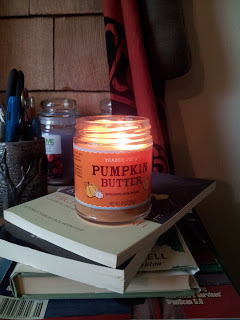 So cozy, so warm.Candles are necessary to my sanity -- and to my writing. Their cheery little flames and randomness of their burning are one of the many little tricks I use to motivate myself. Yet at $10-15 a pillar, what am I to do?
So cozy, so warm.Candles are necessary to my sanity -- and to my writing. Their cheery little flames and randomness of their burning are one of the many little tricks I use to motivate myself. Yet at $10-15 a pillar, what am I to do?I don't know much about wax futures or what goes into the industrial manufacture of sweet-scented conveyors of fire, but for some reason, the price of candles is skyrocketing. They've always been expensive at retail, but I, ever thrifty, knew the places to buy them dirt cheap. Places like thrift stores, dollar stores, and discount stores.
Alas, they've caught on to my schemes, and the price has shot up everywhere. Ikea still remains a decent place to get reasonable (not cheap) candles. And sometimes clearance at Rite Aid of all places. These are lucky finds, not dependable sources at all. [UPDATE: This is now a lie. Whatever caused candles to be expensive has changed again. Also, we now have Wal*Mart. These two concepts may be related.]
I also used to go to ridiculous lengths to make sure a candle burned as much wax as possible to avoid waste. Wasted wax hurt me inside.
Now there's a solution to both problems: Recycling.
Honestly, I wish I'd thought of this years ago, back when I could find those giant three-wick pillars for $10. Those were awesome except for the pound or two of wasted wax. There was never any way to get those little wicks to burn everything, and boy did I try. Some candles refuse to be manipulated. Now I know I could have made seven or eight recycled jar candles with all that wasted wax!
Craft candle-making can be an expensive affair. That is, if you buy blocks of wax from craft stores. But if you have plenty of left-over wax, and get creative on the other supplies, it costs very little to get started.
One of the big expenses in this craft is the stove-top or plug-in melter, and the other assortment of contraptions, metal pourers, molds, and scents that they get bored housewives to buy. And then you end up with yet another box full of trappings for yet another hobby, and who wants that.
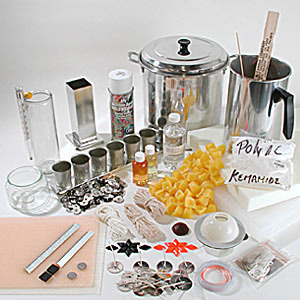 It's like an in-home meth lab.The good news is, you don't need any of that stuff. Here is all you need:
It's like an in-home meth lab.The good news is, you don't need any of that stuff. Here is all you need: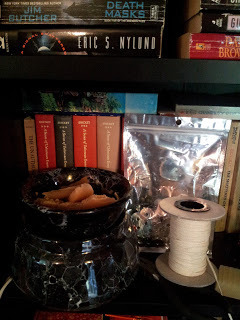 Books not required.
Books not required.I mean, you need books, just not for candle recycling.I already had a wax melter marketed for another purpose. You're supposed to buy scented wax and plop them in the ceramic dish. Wax heats up, room smells nice. Thanks to my marvelous discovery, wax heats up, you make candles. Fortunately, the DMCA doesn't outlaw reverse engineering in the real world. I'm sure the Candle Suppliers Lobby is working on that right now.
 Also known as an "Electric Tart Burner"...
Also known as an "Electric Tart Burner"... Wait, that gives me a more naughty idea!There are a couple of other small items you will need to buy. Like the melter, these are very inexpensive. You can buy them in bulk and they will last forever.
NOTE: There are lots of great reasons to recycle wax. Do it for fun. Do it to save money. Do it to be creative. But don't kid yourself - you're not doing this for the environment! The act of burning candles itself is terrible for carbon emissions.
WARNING: Candles catch fire. That's the point. Wax gets hot, and that is also the point. So stay safe and don't blame me if you set yourself afire or suffer third degree wax burns over half your body. Remember kids, wax play is edge play. Candle-making is an extreme craft - EXTREME!
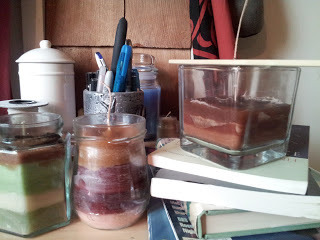 All this could be yours!
All this could be yours!Supply List:
Links go to example supplies on Amazon, though as this post gets older, those links may fail. You'll also want to shop around for the best prices.
Electric wax melter, warmer, or "tart burner" with a removable, smooth texture bowl and a smooth-texture lip.Excess wax from used candlesSmall wide-mouth jars, like jelly jars, former candle jars, or glass vessels they sell at stores. Try drinking glasses. Experiment. Make mistakes. Have fun. MUST BE METAL OR GLASS. No wood, plastic, paper. Because fire. Smaller vessels work better than huge ones.A spool of wick, 24 ply will do.Wick clipsNeedle nose pliersScissorsUnseparated disposable chopsticksScents (optional)A smooth, clean surfaceFirst, take a bunch of old candle wax and put it in the melter and turn it on.
 Double, double toil and trouble; Fire burn, and caldron bubble!
Double, double toil and trouble; Fire burn, and caldron bubble!Cackling is not optional.Don't fill it too full, because that makes it harder to pour. It also depends on how deep of a layer you want on this candle. On mine, I like to fill it a quarter to half full.
A note on scents. I buy scented wax intended for use with the wax melter. It's usually more potent than candle wax. To help re-scent used wax, I'll shave off a bit with a box cutter, and drop it in the mix. This step is totally optional.
Once it's all melted, you have a choice. You can use the melter as designed and leave the wax in there for a day or two to make the room smell nice, adding more scent as it runs out. Or you can pour it right away. But wait. You need something to pour it into.
Choose a jar.
 A Random Array of Independent Jars (RAIJ)The jar should be relatively clean, of course. If it has a label, it's a little less fun, because you can't see the multi-colored layers as they grow, although my Pumpkin Butter jar is hilarious because it's not really pumpkin butter. *giggle*
A Random Array of Independent Jars (RAIJ)The jar should be relatively clean, of course. If it has a label, it's a little less fun, because you can't see the multi-colored layers as they grow, although my Pumpkin Butter jar is hilarious because it's not really pumpkin butter. *giggle*Set the jar on your clean, smooth work surface.
Take the wick spool and measure out a length.
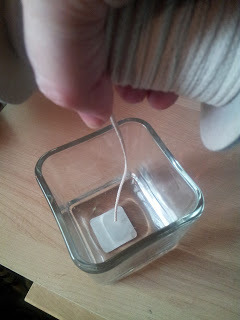 Witty caption needed. Apply within.
Witty caption needed. Apply within.It should be long enough to touch the bottom of the jar, and stick about one inch out the top of the jar.
 So this string walks into a bar...Next we thread the wick clip. There are several ways to do this, and I mix it up each time because my forgetful mind forgets the best way. At this very moment, just for you, I will remember the best way so you can learn it.
So this string walks into a bar...Next we thread the wick clip. There are several ways to do this, and I mix it up each time because my forgetful mind forgets the best way. At this very moment, just for you, I will remember the best way so you can learn it.The goal here is to have the entire wick coated with wax and have the wick clip clamped on the end, without covering yourself in wax. First, take that wick and dip most of it in the wax melter. Pull it out, hold it over the melter, and let it drip and dry for about 30 seconds.
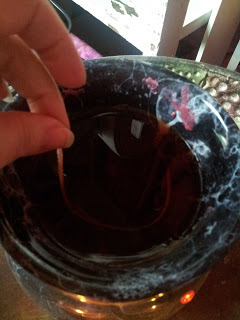 It helps to imagine you are boiling your enemies in oil.Once it's cool, dip the short, unwaxed end. Now thread the cooled end of the wick through the bottom of the wick clip.
It helps to imagine you are boiling your enemies in oil.Once it's cool, dip the short, unwaxed end. Now thread the cooled end of the wick through the bottom of the wick clip. The hole in the bottom is wider, so start there.
The hole in the bottom is wider, so start there.You might be a Master at Needlepoint, but your skills will not help you here.Feed it all the way through until the newly-waxed end is flush with the bottom of the wick clip.
 My momma always taught me to flush.Now the wick clip is yours to command. Using the pliers, smush the small metal bit on the clip to trap the wick inside.
My momma always taught me to flush.Now the wick clip is yours to command. Using the pliers, smush the small metal bit on the clip to trap the wick inside.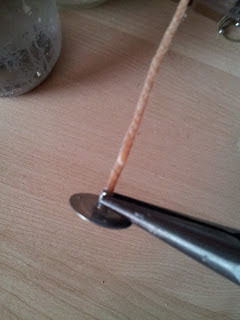 I'm squishing your head!This can be tricky, because the round base of the clip will want to bend along with the nipple. (I didn't pay for highfalutin craft store classes, but I'm pretty sure that's the correct term.) The base should stay as flat as possible. You'll get the hang of it.
I'm squishing your head!This can be tricky, because the round base of the clip will want to bend along with the nipple. (I didn't pay for highfalutin craft store classes, but I'm pretty sure that's the correct term.) The base should stay as flat as possible. You'll get the hang of it.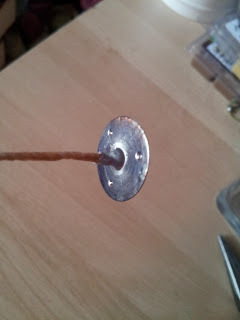 Doubles as a pet wick. If you need a pet.The next step is optional. Sometimes it works and sometimes it doesn't. If it works, it makes things a little easier. Don't fret over failure. Remember, to fail is hilarious.
Doubles as a pet wick. If you need a pet.The next step is optional. Sometimes it works and sometimes it doesn't. If it works, it makes things a little easier. Don't fret over failure. Remember, to fail is hilarious.Dip the wick clip into the wax and...
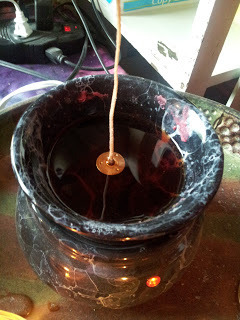 Now you get to boil your friends in oil!...immediately try to get it to stick to the center of the bottom of the jar while the wax is still wet.
Now you get to boil your friends in oil!...immediately try to get it to stick to the center of the bottom of the jar while the wax is still wet. ...and the bartender says, "Hey! Are you a string? No strings allowed!"...The adhesion will be very fragile, if you manage to accomplish it. It makes it a little easier to keep everything straight for the next couple of steps.
...and the bartender says, "Hey! Are you a string? No strings allowed!"...The adhesion will be very fragile, if you manage to accomplish it. It makes it a little easier to keep everything straight for the next couple of steps.Note: that melted wax tends to melt other wax, due to the Second Law of Thermodynamics. Congratulations, you are contributing to the heat death of the universe. So any adhesion you may get from the above step will be undone in later steps. The next few steps will be delicate work. Don't worry about screwing up though. It's just a candle.... made of fire... that wants to CONSUME YOUR HOUSE.
Next take the chopsticks. The goal of this step is to hold the wick straight in the jar. Notice the sticks are pinched together.
 This is why we're using disposable chopsticks, and not, say,
This is why we're using disposable chopsticks, and not, say, random sticks I found in the yard.The wick is going to go between those sticks, and the sticks are going to lay atop the jar with the wick as straight and centered as possible. Meanwhile that wick clip needs to be touching the center of the bottom of the jar, and hopefully stuck there with a tiny dollop of wax. This is tricky business. But fun, right? RIGHT??
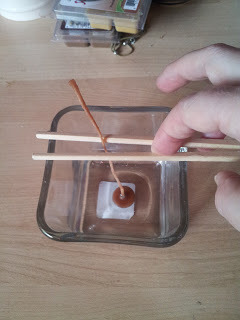 ...the string looks at the bartender, then twists around himself and untwists his ends...
...the string looks at the bartender, then twists around himself and untwists his ends... ...Then the string says, "Nope. I'm a frayed knot!"Okay, now for the cool part. After this step we can set aside the extreme delicacy and just go for "Careful don't burn yourself or spill wax all over grandma's antique quilt OH NO WHAT!"
...Then the string says, "Nope. I'm a frayed knot!"Okay, now for the cool part. After this step we can set aside the extreme delicacy and just go for "Careful don't burn yourself or spill wax all over grandma's antique quilt OH NO WHAT!"Take the bowl off the wax melter. Careful, the bottom of it will be hot. The top edge should be cool enough to touch. (If not, you bought the wrong melter.)
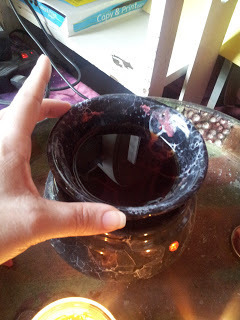 So dainty and delicate.Lift it with both hands (not shown) and, as though it is a leaking hover craft carrying a load of rotten eggs filled with mustard gas, carefully and swiftly move that sucker over to the jar. Make your dexterity roll, and pour it into the jar.
So dainty and delicate.Lift it with both hands (not shown) and, as though it is a leaking hover craft carrying a load of rotten eggs filled with mustard gas, carefully and swiftly move that sucker over to the jar. Make your dexterity roll, and pour it into the jar. Because I am not high enough dexterity
Because I am not high enough dexterity to pour and take a pic at the same time.You did put that jar on a clean, smooth surface, right? A few things can go wrong here. You can totally fail your aim and the wax will get everywhere but in the jar. If you've got a smooth, clean surface, it's not a big deal. You can let it dry and scrape it off and start over. Except what got on the carpet and grandma's antique quilt. Good luck with that.
So yeah, don't crit fail your dex roll. Typically you'll only spill a little bit, until you get practice, and then you'll never spill.
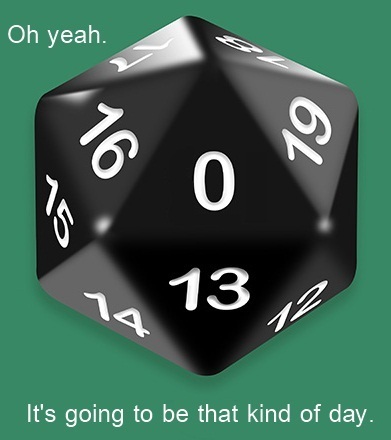
Other things that can go wrong:
You get some wax on the chopsticks. The wick clip melts free, and under the tidal forces of the incoming wax, gets pushed to one side. You get wax on yourself and it burns. You get so distracted by the beauty of life symbolized by the scent of the wax and the miracle of creation that you have an epiphany, quit your job, leave your family, and go off to write a book.To repair any error, make subtle corrections in the now, and in the future try to avoid such mistakes again.
 I did not fail my dex roll.Now that you've poured, there will be a little bit of wax along the lip of the melter bowl. That's not good, because likely the bowl won't get warm enough to melt it way up there, and the frozen wax will later impede pouring attempts. Instead, wait for just a few seconds, just enough for it to set and still be soft. Take your fingernail, and gently peel it back down into the bowl.
I did not fail my dex roll.Now that you've poured, there will be a little bit of wax along the lip of the melter bowl. That's not good, because likely the bowl won't get warm enough to melt it way up there, and the frozen wax will later impede pouring attempts. Instead, wait for just a few seconds, just enough for it to set and still be soft. Take your fingernail, and gently peel it back down into the bowl.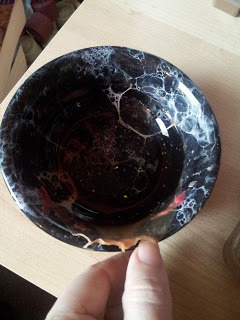 Wax off!Now you're pretty much set. Once the first layer in the jar dries, you have more freedom to adjust the chopsticks. If previously there was a little slack, now you can take it up without misaligning the wicked wick.
Wax off!Now you're pretty much set. Once the first layer in the jar dries, you have more freedom to adjust the chopsticks. If previously there was a little slack, now you can take it up without misaligning the wicked wick.Rinse, repeat, until your jar is full. Don't literally rinse, that would get messy, as you can see in this wax-rinsing demonstration:
When your jar is all full of unrinsed frozen wax, snip the wick down to about 1/4" from the surface of the wax, then the best part: light that sucker on fire!
 All done!
All done!The world is full of producers and consumers. Now you can be both.Caveats and Special Circumstances:
Wax is like truth: It hurts. One special surprise is when you've melted some wax, let it harden in the melter, then turn the melter back on, get impatient after a while and poke the "solid" wax:
 Like a frozen lake, it looks solid enough......only to find it is a deceptive layer disguising the bog of boiling burns below. Don't poke the wax. This gets me every time. EVERY TIME.
Like a frozen lake, it looks solid enough......only to find it is a deceptive layer disguising the bog of boiling burns below. Don't poke the wax. This gets me every time. EVERY TIME. ...but underneath it's lava!When you don't have enough wax to do a whole layer, just store it in the melter.
...but underneath it's lava!When you don't have enough wax to do a whole layer, just store it in the melter. Just hanging out in wax prison awaiting their execution.To store lots of excess wax when you're not ready to make candles: Melt the wax in the melter. Then let it cool. When it's solid, turn on the melter for just a few minutes, to slightly melt the edge of the wax, freeing it from captivity. Pop it out and store in a tidy little wax-pie. Though it may smell delicious, DO NOT EAT.
Just hanging out in wax prison awaiting their execution.To store lots of excess wax when you're not ready to make candles: Melt the wax in the melter. Then let it cool. When it's solid, turn on the melter for just a few minutes, to slightly melt the edge of the wax, freeing it from captivity. Pop it out and store in a tidy little wax-pie. Though it may smell delicious, DO NOT EAT.To rescue wax stuck at the bottom of a jar, simply set the jar on the wax melter without the bowl. Once it's melted, pour into the bowl. Remove any wick clips and junk that is easy to remove.
For the junk that eventually accumulates on the bottom of the bowl: After pouring, it will tend to stay there in the bottom. Just take a tissue and wipe it out while it's still warm. Careful, no burns. Unless you like that sort of thing. In which case, call me.
Cleaning jars: You don't want to run a bunch of wax through your dishwasher. Some wax can be scraped off the inside of the jar with a fingernail. For the rest, let the jar warm on the melter. Then wipe it out with a bunch of Kleenexes. Or you can use warm water from the faucet or heated up on the stove. When dealing with any high temperatures, try not to burn yourself!
Finally, remember -- Wax is fluid BEND IT TO YOUR WILL.
Published on December 30, 2012 20:28
December 26, 2012
Les Misérables and Ayn Rand
I delight in finding flaws in Ayn Rand's reasoning using the tools of logic she promoted. This isn't because I hate Ayn Rand; to the contrary, she has been highly influential and I respect her greatly.
Just as she did, I enjoy battling contradiction where ever I find it. Rand herself said, in the (in)famous John Galt speech of Atlas Shrugged, "To arrive at a contradiction is to confess an error in one’s thinking; to maintain a contradiction is to abdicate one’s mind and to evict oneself from the realm of reality." This woman who espoused individual thinking and death to dogma created perhaps one of the greatest contradictions -- followers who question not a word she spoke, who thirty years after her expiration date continue to walk in lock step and exile anyone who dares question or have an original idea.
Perhaps it is also because I have the heart of a hacker that I love to poke. Rand's philosophy, Objectivism, is a complex yet elegant machine, so self-assured of its own function, wholeness, and security, that I cannot resist breaking it apart whenever I can. Objectivism is a machine that has a place in this world, but it should not run the world. It should click along quietly in the shadows, cranking out interesting ideas, and keeping corruption of certain types in check. It should not produce a type of corruption itself; a corruption which has, unfortunately, permeated much of our society, corporate culture, and government.
It is in this spirit I write this post.
Just as Ayn Rand is one of my influences, she often cited Victor Hugo as one of hers. She idealized romanticism, which she saw as a type of art which distilled reality down into its most poignant, beautiful, powerful parts. Art should lift up humanity's highest values as a guide for all to follow, and she found this in Hugo's work. Her favorite of these works is also my favorite: Les Misérables .{Spoiler warning: Les Mis is one of those timeless stories that shouldn't require a spoiler warning. Ruining the surprise doesn't really ruin the surprise. Nonetheless, I speak in detail from here on out.]
Rand spoke often of the "ideal man" in fiction, and Jean Valjean stood tall as the most ideal of ideal men. She respected his dignity and unremitting honesty, his determination and perseverance, his independence and industry. If these are the traits Ayn Rand loved, she detested their opposites. She had the harshest words about selflessness, altruism, sacrifice, piety, and devotion to God. The poor were probably poor because they refused to lift themselves up, and in a properly structured Capitalist, atheist society, greed would motivate those who wanted a better life badly enough to work for it, and punish those who did not.
Hugo's novel exposed the levers in French society with which the upper class oppressed the lower class. Of this, she said, "Les Misérables was the big experience. Everything about it became important to me, holy, everything that reminded me of it was a souvenir of my love. It was my first view of how one should see life, wider than any concretes of the story. I didn’t approve of the ideas about the poor and the disinherited, except that Hugo set them up in a way that I could sympathize with; they were the victims of government, of the aristocracy, or established authority."
Clearly Rand was inspired by Les Misérables for many of the same reasons I am. Aside from the complex and interesting plot, there is something about the actions of the characters, the unjust world, and the fight for a future freedom, that resounds with the post-Enlightenment soul. I read an abridged version of Les Misérables as a teenager and became familiar with the musical long before I encountered Rand in my late 20's. By then I had seen every film production and had the lyrics to most of the songs memorized.
Yesterday I watched the new film production with Objectivism tickling the back of my mind. The movie fills in details that the musical glosses over. They added quite a few lines of speech and music to explain some of the holes you might not understand from the musical alone. Most of the story fit the Objecticist worldview. In spite of the injustice established by moochers like the French aristocracy and the Thénardiers running around making life generally suck for everyone, Jean Valjean manages to succeed. He never complains. He starts a factory and becomes the mayor, and as he is perused by the unrelentingly lawful Javert throughout France, he manages to continue to succeed, keep his promises, and be an all around great guy.
Clearly an ideal man in a novel that Ayn Rand could have easily written herself. The few times Valjean gives anything to anyone, it's in exchange for something he values. Even his promise to take care of Cosette springs from his personal feelings of justice, since it is by his own inadvertent actions that Fantine, an honest hard-worker, gets fired and eventually dies. Those who give their lives at the barricade do so for the sake of freedom. Marius is a sort of mini-Valjean full of his own ideals and values and noble pursuits. The love between Marius and Cosette is a love of equals, two worthy human beings who find value in each other.
In Hugo's work, altruism loses, virtuous selfishness wins.
Except for one thing. Here is where it all falls apart. All of Valjean's admirable actions and heroic deeds hinge on a single simple act by a minor character -- one act without which Valjean would have died a bitter, thieving moocher of a man. Just another Thénardier, a nameless, faceless, undignified whining wretch. This act is not only altruistic and selfless, it is done in the name of God, by a man of God.
Valjean is given shelter in a cathedral by Bishop Myriel. At his first chance, Valjean steals the silver. When he is caught fleeing, he knows he will be sent back to prison for life. Yet when confronted by the police, the Bishop tells them he gave the silver to Valjean, and offers him two candlesticks that he "forgot". After the police leave, the Bishop tells Valjean to take the silver and begin a new life. In the musical, the Bishop sings, "I have bought your soul for God."
This one action causes a crisis of conscious for Valjean (in contrast to Javert's later crisis when Valjean saves his life). Valjean's cynical view of the world is shattered. He takes the silver and invests in the engines of capitalism, starting the factory and becoming the mayor. He employs hundreds of workers and lives a life Ayn Rand would wholly approve of.
Up until that moment, Valjean was a filthy freeloader. His savior was a selfless man of God. Both Valjean and the Bishop have every trait to qualify as a villain or a victim in a Rand novel. In her story, Valjean would have run off with the silver; blown it all on drugs, charity, taxes, or something equally vile; and returned to steal again. In her story, the Bishop would have used Valjean for his own ends only to meet destruction through his altruistic folly.
Though I respect the values of Objectivism, I am no longer an Objectivist. It is too single-minded, too caught up in the rule of the Laws of Logic to see the exceptions, to see that goodness in life is a balancing act of a whole spectrum of values. Just as Javert could not believe Valjean had been redeemed in spite of all the evidence before him, Ayn Rand ignored that a well-timed selfless act does as much good as well-implemented capitalism. All of our values have a place, and any of them can be taken too far.
Those in power are resourceful at remaining in power. I am as mistrustful of corporate power as I am of the government. Yes, we have come a long way since 19th century France. But we haven't changed as much as we think. Our system is better, yet it still works to keep the poor down. Businesses require money. Intelligence requires good nutrition. Education requires skilled teachers and adequate facilities. Success requires good health, access to computers, and social connections. All of which are out of reach of millions of people. It's not that they are unwilling to climb the ladder of success, but that the first rung is held too high for them to reach.
Without a little help, like the help Bishop Myriel gave Valjean, even the most capable and idealistic of the unfortunate are no more capable of lifting themselves from the gutter than Valjean would have been. Capitalism does not solve every problem. Sometimes it takes a little senseless charity.
Just as she did, I enjoy battling contradiction where ever I find it. Rand herself said, in the (in)famous John Galt speech of Atlas Shrugged, "To arrive at a contradiction is to confess an error in one’s thinking; to maintain a contradiction is to abdicate one’s mind and to evict oneself from the realm of reality." This woman who espoused individual thinking and death to dogma created perhaps one of the greatest contradictions -- followers who question not a word she spoke, who thirty years after her expiration date continue to walk in lock step and exile anyone who dares question or have an original idea.
Perhaps it is also because I have the heart of a hacker that I love to poke. Rand's philosophy, Objectivism, is a complex yet elegant machine, so self-assured of its own function, wholeness, and security, that I cannot resist breaking it apart whenever I can. Objectivism is a machine that has a place in this world, but it should not run the world. It should click along quietly in the shadows, cranking out interesting ideas, and keeping corruption of certain types in check. It should not produce a type of corruption itself; a corruption which has, unfortunately, permeated much of our society, corporate culture, and government.
It is in this spirit I write this post.
Just as Ayn Rand is one of my influences, she often cited Victor Hugo as one of hers. She idealized romanticism, which she saw as a type of art which distilled reality down into its most poignant, beautiful, powerful parts. Art should lift up humanity's highest values as a guide for all to follow, and she found this in Hugo's work. Her favorite of these works is also my favorite: Les Misérables .{Spoiler warning: Les Mis is one of those timeless stories that shouldn't require a spoiler warning. Ruining the surprise doesn't really ruin the surprise. Nonetheless, I speak in detail from here on out.]
Rand spoke often of the "ideal man" in fiction, and Jean Valjean stood tall as the most ideal of ideal men. She respected his dignity and unremitting honesty, his determination and perseverance, his independence and industry. If these are the traits Ayn Rand loved, she detested their opposites. She had the harshest words about selflessness, altruism, sacrifice, piety, and devotion to God. The poor were probably poor because they refused to lift themselves up, and in a properly structured Capitalist, atheist society, greed would motivate those who wanted a better life badly enough to work for it, and punish those who did not.
Hugo's novel exposed the levers in French society with which the upper class oppressed the lower class. Of this, she said, "Les Misérables was the big experience. Everything about it became important to me, holy, everything that reminded me of it was a souvenir of my love. It was my first view of how one should see life, wider than any concretes of the story. I didn’t approve of the ideas about the poor and the disinherited, except that Hugo set them up in a way that I could sympathize with; they were the victims of government, of the aristocracy, or established authority."
Clearly Rand was inspired by Les Misérables for many of the same reasons I am. Aside from the complex and interesting plot, there is something about the actions of the characters, the unjust world, and the fight for a future freedom, that resounds with the post-Enlightenment soul. I read an abridged version of Les Misérables as a teenager and became familiar with the musical long before I encountered Rand in my late 20's. By then I had seen every film production and had the lyrics to most of the songs memorized.
Yesterday I watched the new film production with Objectivism tickling the back of my mind. The movie fills in details that the musical glosses over. They added quite a few lines of speech and music to explain some of the holes you might not understand from the musical alone. Most of the story fit the Objecticist worldview. In spite of the injustice established by moochers like the French aristocracy and the Thénardiers running around making life generally suck for everyone, Jean Valjean manages to succeed. He never complains. He starts a factory and becomes the mayor, and as he is perused by the unrelentingly lawful Javert throughout France, he manages to continue to succeed, keep his promises, and be an all around great guy.
Clearly an ideal man in a novel that Ayn Rand could have easily written herself. The few times Valjean gives anything to anyone, it's in exchange for something he values. Even his promise to take care of Cosette springs from his personal feelings of justice, since it is by his own inadvertent actions that Fantine, an honest hard-worker, gets fired and eventually dies. Those who give their lives at the barricade do so for the sake of freedom. Marius is a sort of mini-Valjean full of his own ideals and values and noble pursuits. The love between Marius and Cosette is a love of equals, two worthy human beings who find value in each other.
In Hugo's work, altruism loses, virtuous selfishness wins.
Except for one thing. Here is where it all falls apart. All of Valjean's admirable actions and heroic deeds hinge on a single simple act by a minor character -- one act without which Valjean would have died a bitter, thieving moocher of a man. Just another Thénardier, a nameless, faceless, undignified whining wretch. This act is not only altruistic and selfless, it is done in the name of God, by a man of God.
Valjean is given shelter in a cathedral by Bishop Myriel. At his first chance, Valjean steals the silver. When he is caught fleeing, he knows he will be sent back to prison for life. Yet when confronted by the police, the Bishop tells them he gave the silver to Valjean, and offers him two candlesticks that he "forgot". After the police leave, the Bishop tells Valjean to take the silver and begin a new life. In the musical, the Bishop sings, "I have bought your soul for God."
This one action causes a crisis of conscious for Valjean (in contrast to Javert's later crisis when Valjean saves his life). Valjean's cynical view of the world is shattered. He takes the silver and invests in the engines of capitalism, starting the factory and becoming the mayor. He employs hundreds of workers and lives a life Ayn Rand would wholly approve of.
Up until that moment, Valjean was a filthy freeloader. His savior was a selfless man of God. Both Valjean and the Bishop have every trait to qualify as a villain or a victim in a Rand novel. In her story, Valjean would have run off with the silver; blown it all on drugs, charity, taxes, or something equally vile; and returned to steal again. In her story, the Bishop would have used Valjean for his own ends only to meet destruction through his altruistic folly.
Though I respect the values of Objectivism, I am no longer an Objectivist. It is too single-minded, too caught up in the rule of the Laws of Logic to see the exceptions, to see that goodness in life is a balancing act of a whole spectrum of values. Just as Javert could not believe Valjean had been redeemed in spite of all the evidence before him, Ayn Rand ignored that a well-timed selfless act does as much good as well-implemented capitalism. All of our values have a place, and any of them can be taken too far.
Those in power are resourceful at remaining in power. I am as mistrustful of corporate power as I am of the government. Yes, we have come a long way since 19th century France. But we haven't changed as much as we think. Our system is better, yet it still works to keep the poor down. Businesses require money. Intelligence requires good nutrition. Education requires skilled teachers and adequate facilities. Success requires good health, access to computers, and social connections. All of which are out of reach of millions of people. It's not that they are unwilling to climb the ladder of success, but that the first rung is held too high for them to reach.
Without a little help, like the help Bishop Myriel gave Valjean, even the most capable and idealistic of the unfortunate are no more capable of lifting themselves from the gutter than Valjean would have been. Capitalism does not solve every problem. Sometimes it takes a little senseless charity.
Published on December 26, 2012 20:12
December 12, 2012
The Next Big Thing
Andrew Williams graciously invited me to be next in the Next Big Thing blog hop. He got it from Eric J. Guignard, who got it from Erik T. Johnson, who caught it from John F.D. Taff, who doesn't really remember where he got it from.
If all infections diseases were so fun and productive to spread, we'd have no need for modern medicine. I guess that's why they think of memes as a life form. The symptom of this disease is that I will be posting the answers to ten questions about my current work in progress. As a reader, you have no need to fear -- I will not be spreading this infection to you. If you never engage in the unsafe act of writing fiction, you are inoculated.
My writer friends, on the other hand, are completely exposed, and I have infected tagged four of them who will be acting out their symptoms next week on December 19th.
Hey, at least it's not a pyramid scheme...
...or IS it?
Now for the questions...
What is the working title of your next book?
Emerald City Iron. The theme grew nicely out of the working title, so it is now firmly the title.
Where did the idea come from for the book?
This novel is a sequel to my last novel, Emerald City Dreamer. I wanted a simple monster-hunting plot to parallel Sandy's inner growth, and so used the most horrifying monster I'd ever encountered in all of my fairy lore research - the Nuckelavee. Because I never can be too mean to Sandy.
What genre does your book fall under?
Urban Fantasy.
What actors would you choose to play the part of your characters in a movie rendition?
Scarlett Johansson would make a pretty decent Sandy, as long as she's wearing reading glasses.
 Only with auburn hair.
Only with auburn hair.
 Woops, did I accidentally trick you with enigmatic phrasing again?
Woops, did I accidentally trick you with enigmatic phrasing again?
I'm such a faerie!Kirsten Dunst has the perfect face to play Gretel - round and youthful, almost childlike.
 Only with round glasses and an accent.Jamie Hyneman of Mythbusters might make a good Hollis, if he had long white hair and shaved everything below his nose instead. Philip Seymour Hoffman has the right versatility and subtly as an actor, but not quite the right face.
Only with round glasses and an accent.Jamie Hyneman of Mythbusters might make a good Hollis, if he had long white hair and shaved everything below his nose instead. Philip Seymour Hoffman has the right versatility and subtly as an actor, but not quite the right face.
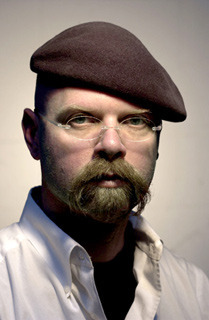 Hollis is likely to glare, like this. Also he is just as likely to make something nerdy and cool...
Hollis is likely to glare, like this. Also he is just as likely to make something nerdy and cool...
 ...but this guy can actually act.Emily Haines, lead singer in Metric, would make a perfect Jina. I wouldn't want anyone else to play this part.
...but this guy can actually act.Emily Haines, lead singer in Metric, would make a perfect Jina. I wouldn't want anyone else to play this part.
 Everybody just want to fall in love.
Everybody just want to fall in love.
Everybody just wanna play the lead.Jett would be a difficult role to fill, given her other-worldliness. Aside from having elfin features, she is half-Japanese, half-Irish. Matsushima Nanako or Yuko Takeuchi might come close.
 She's a thousand years old..
She's a thousand years old..
 ...but you'd never know it. Maybe it's Maybelline.*
...but you'd never know it. Maybe it's Maybelline.*
(*Actually, it's glamour created by feasting on the will of dreamers.)What is the one-sentence synopsis of your book?
While hunting down a dangerous faerie sea monster, Sandy Windham gets help from a therapist and discovers why her inner demons won't stay dead.
Will your book be self-published or represented by an agency?
I will self-publish Emerald City Iron to retain creative control of the series.
How long did it take you to write the first draft of the manuscript?
This is a very short novel. My target was novella and it went long. I took my time, editing old scenes as I continued to write new ones. I began plotting and outlining in mid-September, and I finished the final scene in mid-November. So about two months. Now I'm doing final cleanup, which is going really quickly.
What other books would you compare this story to within your genre?
To be honest, I don't read enough Urban Fantasy to make a comparison. I do try to be unique, crafting deeply psychological UF, and so far, I haven't run across anyone else doing that. If you have, please let me know in the comments and I'll check it out.
Who or what inspired you to write this book?
Folklore. And I drew very strongly from my own experiences with hunting faeries personal growth and trauma recovery. Metaphorically, Sandy's struggles in Emerald City Iron mirror my own during the past year. I learned as much from her as she learned from me.
What else about the book might pique the reader's interest?
Seattle. Faeries. Danger. New characters. Thematic metaphors. Harpoon cannons. Squirt guns. Beach battles. Surprises. Tir Nan Og. Angry elves. Abandoned buildings. Drinking. Hallucinations. Cellar Demons. Bodies. Mutilated cattle. Explosions. Boats. Seagull poop. Trespassing.
Tag, You're It
The following four authors are totally cool, and they're all working on the Next Big Thing. Be sure to visit they're blogs on December 19th to catch a glimpse of their projects.
John Nakamura Remy
Andrew Rosenberg
Elf Sternberg
Jennifer Brozek

If all infections diseases were so fun and productive to spread, we'd have no need for modern medicine. I guess that's why they think of memes as a life form. The symptom of this disease is that I will be posting the answers to ten questions about my current work in progress. As a reader, you have no need to fear -- I will not be spreading this infection to you. If you never engage in the unsafe act of writing fiction, you are inoculated.
My writer friends, on the other hand, are completely exposed, and I have infected tagged four of them who will be acting out their symptoms next week on December 19th.
Hey, at least it's not a pyramid scheme...
...or IS it?
Now for the questions...
What is the working title of your next book?
Emerald City Iron. The theme grew nicely out of the working title, so it is now firmly the title.
Where did the idea come from for the book?
This novel is a sequel to my last novel, Emerald City Dreamer. I wanted a simple monster-hunting plot to parallel Sandy's inner growth, and so used the most horrifying monster I'd ever encountered in all of my fairy lore research - the Nuckelavee. Because I never can be too mean to Sandy.
What genre does your book fall under?
Urban Fantasy.
What actors would you choose to play the part of your characters in a movie rendition?
Scarlett Johansson would make a pretty decent Sandy, as long as she's wearing reading glasses.
 Only with auburn hair.
Only with auburn hair. Woops, did I accidentally trick you with enigmatic phrasing again?
Woops, did I accidentally trick you with enigmatic phrasing again? I'm such a faerie!Kirsten Dunst has the perfect face to play Gretel - round and youthful, almost childlike.
 Only with round glasses and an accent.Jamie Hyneman of Mythbusters might make a good Hollis, if he had long white hair and shaved everything below his nose instead. Philip Seymour Hoffman has the right versatility and subtly as an actor, but not quite the right face.
Only with round glasses and an accent.Jamie Hyneman of Mythbusters might make a good Hollis, if he had long white hair and shaved everything below his nose instead. Philip Seymour Hoffman has the right versatility and subtly as an actor, but not quite the right face. Hollis is likely to glare, like this. Also he is just as likely to make something nerdy and cool...
Hollis is likely to glare, like this. Also he is just as likely to make something nerdy and cool...
 ...but this guy can actually act.Emily Haines, lead singer in Metric, would make a perfect Jina. I wouldn't want anyone else to play this part.
...but this guy can actually act.Emily Haines, lead singer in Metric, would make a perfect Jina. I wouldn't want anyone else to play this part. Everybody just want to fall in love.
Everybody just want to fall in love.Everybody just wanna play the lead.Jett would be a difficult role to fill, given her other-worldliness. Aside from having elfin features, she is half-Japanese, half-Irish. Matsushima Nanako or Yuko Takeuchi might come close.
 She's a thousand years old..
She's a thousand years old..
 ...but you'd never know it. Maybe it's Maybelline.*
...but you'd never know it. Maybe it's Maybelline.*(*Actually, it's glamour created by feasting on the will of dreamers.)What is the one-sentence synopsis of your book?
While hunting down a dangerous faerie sea monster, Sandy Windham gets help from a therapist and discovers why her inner demons won't stay dead.
Will your book be self-published or represented by an agency?
I will self-publish Emerald City Iron to retain creative control of the series.
How long did it take you to write the first draft of the manuscript?
This is a very short novel. My target was novella and it went long. I took my time, editing old scenes as I continued to write new ones. I began plotting and outlining in mid-September, and I finished the final scene in mid-November. So about two months. Now I'm doing final cleanup, which is going really quickly.
What other books would you compare this story to within your genre?
To be honest, I don't read enough Urban Fantasy to make a comparison. I do try to be unique, crafting deeply psychological UF, and so far, I haven't run across anyone else doing that. If you have, please let me know in the comments and I'll check it out.
Who or what inspired you to write this book?
Folklore. And I drew very strongly from my own experiences with hunting faeries personal growth and trauma recovery. Metaphorically, Sandy's struggles in Emerald City Iron mirror my own during the past year. I learned as much from her as she learned from me.
What else about the book might pique the reader's interest?
Seattle. Faeries. Danger. New characters. Thematic metaphors. Harpoon cannons. Squirt guns. Beach battles. Surprises. Tir Nan Og. Angry elves. Abandoned buildings. Drinking. Hallucinations. Cellar Demons. Bodies. Mutilated cattle. Explosions. Boats. Seagull poop. Trespassing.
Tag, You're It
The following four authors are totally cool, and they're all working on the Next Big Thing. Be sure to visit they're blogs on December 19th to catch a glimpse of their projects.
John Nakamura Remy
Andrew Rosenberg
Elf Sternberg
Jennifer Brozek
Published on December 12, 2012 10:49
October 22, 2012
No Mo Wri Mo: Why I Am Regrettably Not Doing NaNoWriMo This Year
I am a two-time NaNoWriMo winner. It took me years to get up the courage (and a lost job) to finally get around to it in 2010. Right before NaNoWriMo, I had nearly completed my first novel, Emerald City Dreamer. For NaNoWriMo, I paused that project, and started a whole new project, an alternative history vampire fantasy, with my novel The Sun Never Rises.
As much as I loved the world I built, and my character, and the ending, I have not read The Sun Never Rises. Not once in two years. I haven't had time.
My third novel, Emerald City Hunter, I wrote during last year's NaNoWriMo.
For both projects, I came in at higher than 50,000 words. Right around 65,000 each. I proved I have no problem cranking out high word counts. Awesome.
Unfortunately, those words suck. Not all of them, but enough of them to make editing a real problem. I realize this is the point of NaNoWriMo, to write words that suck, just so long as you write them. And yes, those were my first novels, so they were probably going to suck anyway. I had a lot to learn about how to make 50,000+ words not suck. Some of those I learned during the writing process itself, and some during the grueling editing process.
Now that I've learned those lessons, I'm going for the long view.
I understand my pace better now. It is similar to my process for short stories. Plan, outline, write a few chapters, go back, revisit the outline, revise some future scenes in the outline, edit the past scenes a little bit, write the future scenes, revisit the outline, edit some old scenes, and so on.
When I do it that way, I end up with is a draft that is more satisfying and very solid. It is nearly ready, with some slight polish, to be shown to my writer's group, Cloud City Wordslingers. It is less frustrating and time-consuming when it comes to editing.
Word counts are antithetical to this process. And it takes longer than 30 days.
November is coming, and I see everyone talking about NaNoWriMo. I'm sad. I want to be along with you guys, cheering each other on, sharing problems and woes, and hitting 2-4k words per day. I will feel a little left out, and a little nostalgic for those past NaNoWriMos that were probably a lot more miserable than I remember. It will be hard, knowing I could have another novel under my belt. But I know it will be a novel that will likely have to sit in a drawer for years before I get time to edit it.
I will, however, be doing "WriMo". I will be writing all month. I won't be watching word counts. I won't be aiming at 50,000 words on a single project. I am aiming to finish Emerald City Iron (novella, already half done) to draft that can be read by my fellow Wordslingers. And I will be aiming to begin plotting the next novella. I will share progress on Twitter and here.
Good luck to all WriMos, whether you're doing a novel, a couple novellas, or a pile of short stories. I thank the NaNoWriMo people for holding that carrot out to me for years prior to 2010, to make me keep thinking, "I ought to get back to writing someday", and to letting me win two years in a row.
As much as I loved the world I built, and my character, and the ending, I have not read The Sun Never Rises. Not once in two years. I haven't had time.
My third novel, Emerald City Hunter, I wrote during last year's NaNoWriMo.
For both projects, I came in at higher than 50,000 words. Right around 65,000 each. I proved I have no problem cranking out high word counts. Awesome.
Unfortunately, those words suck. Not all of them, but enough of them to make editing a real problem. I realize this is the point of NaNoWriMo, to write words that suck, just so long as you write them. And yes, those were my first novels, so they were probably going to suck anyway. I had a lot to learn about how to make 50,000+ words not suck. Some of those I learned during the writing process itself, and some during the grueling editing process.
Now that I've learned those lessons, I'm going for the long view.
I understand my pace better now. It is similar to my process for short stories. Plan, outline, write a few chapters, go back, revisit the outline, revise some future scenes in the outline, edit the past scenes a little bit, write the future scenes, revisit the outline, edit some old scenes, and so on.
When I do it that way, I end up with is a draft that is more satisfying and very solid. It is nearly ready, with some slight polish, to be shown to my writer's group, Cloud City Wordslingers. It is less frustrating and time-consuming when it comes to editing.
Word counts are antithetical to this process. And it takes longer than 30 days.
November is coming, and I see everyone talking about NaNoWriMo. I'm sad. I want to be along with you guys, cheering each other on, sharing problems and woes, and hitting 2-4k words per day. I will feel a little left out, and a little nostalgic for those past NaNoWriMos that were probably a lot more miserable than I remember. It will be hard, knowing I could have another novel under my belt. But I know it will be a novel that will likely have to sit in a drawer for years before I get time to edit it.
I will, however, be doing "WriMo". I will be writing all month. I won't be watching word counts. I won't be aiming at 50,000 words on a single project. I am aiming to finish Emerald City Iron (novella, already half done) to draft that can be read by my fellow Wordslingers. And I will be aiming to begin plotting the next novella. I will share progress on Twitter and here.
Good luck to all WriMos, whether you're doing a novel, a couple novellas, or a pile of short stories. I thank the NaNoWriMo people for holding that carrot out to me for years prior to 2010, to make me keep thinking, "I ought to get back to writing someday", and to letting me win two years in a row.
Published on October 22, 2012 11:57
October 18, 2012
Grapheme-Color Synesthesia Map
This week I've been doing a lot of thinking about synesthesia, thanks to a video, My Autism and Me. Some stray tweets led to interesting conversations on Twitter and email. Dr. Joe Spataro did a blog post, in which I sum up my synesthesia story in brief.
I have tons of thoughts on this topic, as well as tons of memories and my own story of realizing my rare skill at a young age, before I even knew the word "synesthesia", and before modern science had caught up to the idea of the grapheme-color type, where letters and numbers have color. Eventually, I may put some of those thoughts and stories in this blog.
For now, I've taken the time to map my colors for you. This is a mini-meme going around on DeviantArt and other circles on the internet. The template is made available by a Deviant Artist, Crowbar. Hat tip to my daughter Betsey for pointing me in this direction.
This is part of me. A very deep part of who I am and how my brain works. I love the wonderful colors I "see" every day in the words I read, in license plates, on signs, in phone numbers. I am an associator, which means I visualize the letters in color in my mind. The colors almost seem to pop out at me from the page - but stop just short of being real.
Inside? They are more real than real.
Welcome to my world.
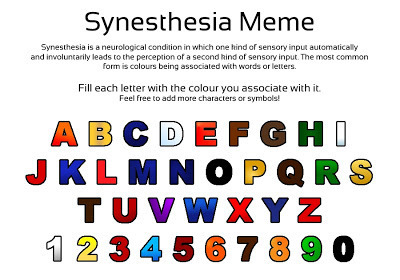
I can't tell you how satisfying it is to look at the page and physically see how the letters should be. How they are meant to be. Not these black pretenders everywhere... I can see into your hearts, all of you, and these are your true colors.
I agonized to get these just right. Some of these letters I didn't get just right, and they're glaring at me. (Shut it, "B", you came early on before I'd figured out the software, and the tan shades are the hardest to find in the color tool!)
Note that none of my letters actually have a black border. I would prefer removing them, but that would require more graphics skills than I have. :) Lowercase letters are the same color as uppercase, though some are slightly different shades.
I shaded some of the letters to help show the motion they have. These are the letters that roam about, swirling or morphing through these particular shades. A few will change a lot. "I" is the hardest to pin down, since it can be a still solid white, gray, or bluish-grayish-morphy-whatever.
All of my letters will influence one another when they sit next to each other in words. That's when things get really interesting. Someday I may get creative and try to show you. I'd also love to show you my symbols like * and ~.
If you believe you may be a synesthete, please do a science. Take the surveys at SynesthesiaResearch.com, and the full battery at synesthete.org.
I have tons of thoughts on this topic, as well as tons of memories and my own story of realizing my rare skill at a young age, before I even knew the word "synesthesia", and before modern science had caught up to the idea of the grapheme-color type, where letters and numbers have color. Eventually, I may put some of those thoughts and stories in this blog.
For now, I've taken the time to map my colors for you. This is a mini-meme going around on DeviantArt and other circles on the internet. The template is made available by a Deviant Artist, Crowbar. Hat tip to my daughter Betsey for pointing me in this direction.
This is part of me. A very deep part of who I am and how my brain works. I love the wonderful colors I "see" every day in the words I read, in license plates, on signs, in phone numbers. I am an associator, which means I visualize the letters in color in my mind. The colors almost seem to pop out at me from the page - but stop just short of being real.
Inside? They are more real than real.
Welcome to my world.

I can't tell you how satisfying it is to look at the page and physically see how the letters should be. How they are meant to be. Not these black pretenders everywhere... I can see into your hearts, all of you, and these are your true colors.
I agonized to get these just right. Some of these letters I didn't get just right, and they're glaring at me. (Shut it, "B", you came early on before I'd figured out the software, and the tan shades are the hardest to find in the color tool!)
Note that none of my letters actually have a black border. I would prefer removing them, but that would require more graphics skills than I have. :) Lowercase letters are the same color as uppercase, though some are slightly different shades.
I shaded some of the letters to help show the motion they have. These are the letters that roam about, swirling or morphing through these particular shades. A few will change a lot. "I" is the hardest to pin down, since it can be a still solid white, gray, or bluish-grayish-morphy-whatever.
All of my letters will influence one another when they sit next to each other in words. That's when things get really interesting. Someday I may get creative and try to show you. I'd also love to show you my symbols like * and ~.
If you believe you may be a synesthete, please do a science. Take the surveys at SynesthesiaResearch.com, and the full battery at synesthete.org.
Published on October 18, 2012 22:20
September 28, 2012
Guest Post at JoUE
I've written a guest post over at the Journal of Unlikely Entomology, wherein I discuss the making of the story, Let the Bugs Work Themselves Out.
It begins...

It begins...
When I wrote Let the Bugs Work Themselves Out, I was delirious with fever, caused by what doctors want me to believe was a common flu, but what I am convinced was a medical conspiracy to test a new strain of Black-Death-Hell-Anthrax-Ebola-Pox. It was more than a fever. My perception twisted into weird little skews and everything felt grotesque and creepy. You know that feeling you had while watching Eraserhead? That was an actual symptom of this "flu".
I knew it wasn't wise to work on my novel in this state. Instead...Continue...
Published on September 28, 2012 14:22



